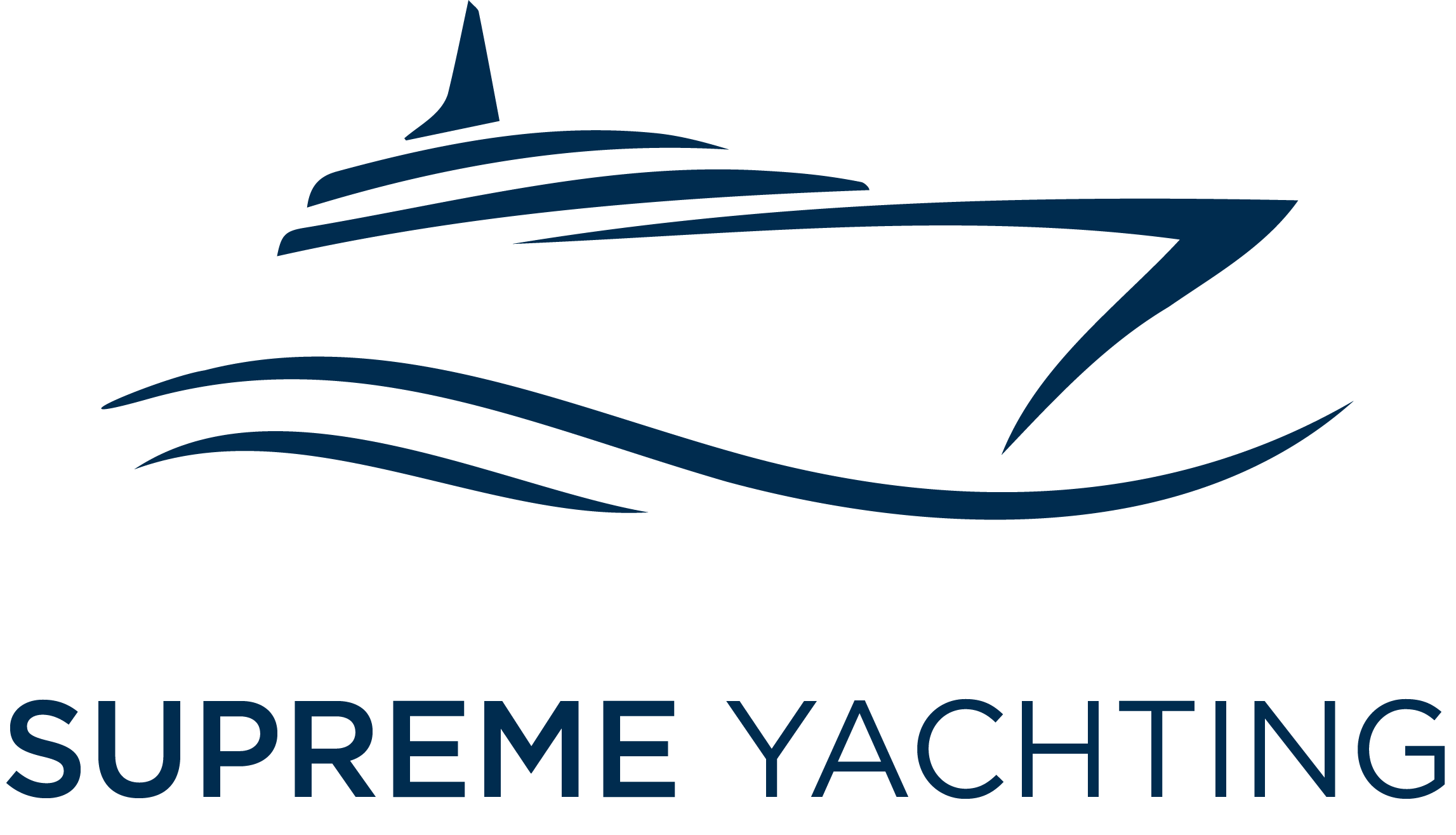

SALES & CHARTER
Yacht sales.
Our team has a wealth of experience and expertise in the yacht sales industry, and we are dedicated to providing top-notch services to our clients worldwide. Our extensive network and deep understanding of the market allows us to offer unparalleled assistance in the sale and purchase of yachts.
We are here to guide you through the entire process, from pricing your yacht to completing any sale transaction.

YACHT CHARTER
Supreme Yachting takes pride in having the most comprehensive network and have partnered with pedigree yachts available worldwide for chartering. We go above and beyond to ensure that our clients have a seamless and unforgettable experience onboard our luxurious vessels. We offer a wide range of amenities and services tailored to your specific needs and desires. Our team is dedicated to providing you with exceptional customer service and ensuring that every detail of your journey is taken care of.

Contact us for Berth Reservation
Jekaterina Salupova
Managing Director
Greetings from Supreme Yachts!
I'm thrilled to welcome you to a world of unparalleled yacht experiences. Our commitment to excellence, safety, and personalized service ensures each moment on board is extraordinary. Our fleet is not just a collection of vessels; it's a gateway to unforgettable memories. Thank you for choosing Supreme Yachts. Join us in embracing the sea's allure with style and luxury. Here, every journey is a unique adventure. We look forward to being part of your maritime dreams. Welcome aboard!
“Supreme Yachts isn't just about luxury adventures at sea; it's a story of passion and dedication. Founded in Dubai in 2023 by a small team of dedicated brokers, their love for yachting and the Arabian Gulf's captivating beauty fueled their ambition. Through sheer hard work and perseverance, they charted a remarkable course for the company. Supreme Yachts' journey has been one of constant growth. What began with a handful of passionate individuals has blossomed into a flourishing company with a presence across the globe. Today, we offer a stunning selection of yachts for charter and purchase in various locations, including Turkey, Croatia, the UAE, Greece, Spain, and France.”
“At Supreme Yachts, our vision is as clear as the turquoise waters we navigate: to become the leading luxury yacht charter and brokerage company in the Gulf Region. But our ambition extends beyond regional dominance. We aim to set new standards for yachting experiences worldwide. We envision a world where every moment spent onboard our magnificent vessels becomes a cherished memory. Imagine the thrill of exploration as you discover hidden coves and pristine islands, seamlessly blended with the tranquility of unparalleled luxury.”
Our mission is unwavering - to offer a seamless and personalized yachting experience that surpasses all expectations. Whether it's a celebration with loved ones, a corporate retreat, or a dream yacht acquisition, we are dedicated to making every journey with Supreme Yachts unforgettable.
Our passion sets us apart. When you step aboard our meticulously maintained yachts, you embark on a journey guided by our team's genuine dedication to excellence. We are more than just a service provider; we are dreamweavers, creating tailored charters and personalized brokerage experiences that resonate with your deepest desires. Welcome aboard Supreme Yachts – Your trusted partner in making your maritime dreams come true,

Stanford’s Deborah Sivas on SCOTUS’ Loper Decision overturning Chevron and the Impact on Environmental Law
- June 28, 2024
- Deborah A. Sivas
- Q&A with Sharon Driscoll
- Share on Twitter
- Share on Facebook
- Share by Email
On Friday, June 28, the U.S. Supreme Court overturned Chevron in Loper Bright Enterprises v. Raimondo— upending 40 years of precedent that has been cited in dozens of Supreme Court cases and thousands of lower court rulings. At issue is the Administrative Procedure Act and the independence of government agencies, such as the Environmental Protection Agency (EPA). Here Stanford Law Professor Deborah Sivas, an environmental law expert, discusses the case and its implications.

Can you first briefly explain the landmark Court ruling Chevron v. Natural Resources Defense Council that was overturned today?
The Chevron case, decided in 1984, applied a two-step approach for interpreting federal statutes implemented by administrative agencies. Chevron directed federal courts, in reviewing an agency’s interpretation of a statute, to determine, first, whether Congress has directly spoken to the precise statutory question at issue. If so, the intent of Congress is clear and courts should give effect to that intent. If, however, the statute is silent or ambiguous, Chevron directed courts to defer to the agency’s reading of the statutory provision as long as that interpretation was a permissible construction of the language. The doctrine established by Chevron , therefore, substantially deferred to agencies’ interpretations of the laws they administer.
Chevron has been in place for 40 years and has been cited thousands of times by both the Supreme Court and lower courts, right? What does today’s decision mean for established law?

Yes, probably tens of thousands of lower court cases over the last four decades have relied on Chervon in some fashion. The Court’s opinion today makes clear that the settled judgments in those cases are not affected—that is, the Loper Bright Enterprises ruling will not be grounds for revisiting those cases. But going forward, it does portend a sea change for any new cases that raise questions of statutory interpretation.
How did the majority support this decision? What was their argument?
The decision itself is premised on what the majority believes is a plain text reading of the Administrative Procedure Act, which governs judicial challenges to agency actions. The majority opinion, authored by Chief Justice Roberts, essentially says that Chervon was wrongly decided in 1984 “by a bare quorum of six Justices” because it conflicts with APA’s directive that courts (not agencies) should decide “all relevant questions of law.” The majority opinion justifies today’s reversal, in part, through a lengthy discussion of the many exceptions carved out of the Chevron doctrine by the Court in recent years. Justice Roberts argues that while Chevron has remained on the books, it has become a “decaying husk” of “crumbling precedents” that warrants overturning.
Has Chevron been suffering a slow death?
Today’s decision is, really, the culmination of decades of effort to reduce the role of government in our lives, even as the problems generated by modern society become increasingly acute and increasingly complex. It is more than a bit scary to think that federal judges—many of whom are increasingly ideological and almost none of whom have specialized training beyond a JD—are now more empowered to strike down agency rules and actions they don’t like, particularly knowing that Congress seems incapable of providing an effective check on such judicial power.
How will this decision impact the work of agencies such as the EPA? And will it empower courts?
We will see how agencies adjust to the decision—they have been aware for some time that Chervon was hanging by a thread—and how the lower courts react. But today’s ruling is likely to have far reaching impacts for the EPA, the FDA, and similar regulatory agencies, in part because the statutes which these agencies implement—the Clean Air Act, for example—are highly technical and applying them to contemporary problems like climate change requires the exercise of expert judgment. The deference which courts might have given to such expert judgments under Chevron is now largely a thing of the past.
Take climate policy: Congress has never enacted climate legislation and, given the extremely partisan nature of our current political system, is not likely to do so anytime in the near future. To address contemporary concerns, therefore, the EPA has turned largely to the Clean Air Act, which was enacted in 1970, long before climate change came onto the public radar. The Clean Act does not speak directly to greenhouse gas emissions or climate policy—that is, it is silent on those issues. So, the EPA has interpreted and applied various provisions of the statue to address climate issues. Courts will no longer be able to defer to the agency’s interpretation of the statute, setting the stage for the judiciary to more easily strike down climate regulations. The same is true across all federal regulatory agencies.
The Court did leave the door open for so-called Skidmore deference, which is an old New Deal-era case (enacted around the same time as the APA) that counseled courts to give some “respect” to an agency’s statutory interpretation where that interpretation is “persuasive.” But whether an agency interpretation is persuasive to a particular judge or court is obviously a very subjective standard. I suspect that courts that want to uphold an agency regulation may rely on Skidmore , and courts that disagree with an agency won’t.
You have been a leading environmental lawyer since the early days after the Chevron decision. How important is today’s decision to the work you do?
It will likely have a significant impact on the work we do, honestly in both directions. For regulatory action that aims to protect the public and the environment from harm, today’s decision will make things more difficult for agencies like the EPA and for those who advocate more protective policies. That is precisely the reason that conservative legal scholars and potential targets of such regulation have pushed, literally for decades now, to jettison Chevron .
On the other hand, there are a number of federal agencies, like the U.S. Forest Service and the Bureau of Land Management, which manage most of the federal public lands, that have been largely captured by the entities they regulate—timber companies, mining interests, etc. These agencies often seek Chevron deference for pro-development and pro-extraction rules and decisions. Many of our community partners in those circumstances might well be happy to see Chevron gone.
But on balance, my own view is that today’s decision will have an overall adverse impact on the federal government’s ability to protect the public from all kinds of harms—environmental, economic, social, etc.
Are there any legal avenues around this decision?
The decision is likely to put even more pressure on regulatory agencies to justify their interpretations, and I suspect it will make them less willing to color outside the lines of older statutes to address modern problems—precisely the effect that conservative commentators intended.
I’m curious how things will play out in the lower courts and whether today’s decision actually increases the workload and uncertainty for the federal judiciary. Recent analogues suggest that the Supreme Court’s wholesale jettison of settled precedent, for instance in the abortion and gun rights cases, can cause chaos. In both instances, the uncertainty created by those rulings has prompted a lot of new litigation, including cases moving through the system to the Supreme Court. In last weeks’ Rahimi decision, for instance, we saw the Court start to back-peddle on the expansive Bruen case, and there are many other Second Amendment challenges now bouncing around the courts in the hopes of overturning gun control measures after Bruen . The same trajectory may play out in the Chevron context, where lower courts must now figure out how to exercise their “independent judgment” in interpreting statutes as applied to contemporary problems that Congress did not expressly address in a given law. I don’t think this is the last we will see of the issue before the Supreme Court.
Is there anything else you’d like to add about this decision and its impact on environmental issues going forward?
The slow fall of Chevron —today’s opinion says that the Supreme Court has not relied on the doctrine since 2016 and, as a practitioner, I know that the Department of Justice basically stopped using it during the Trump years—has been accompanied by the rise of the so-called “major questions doctrine.” That doctrine, to which the Supreme Court gave its official blessing in the 2022 West Virginia decision striking down EPA’s Clean Power Plan for reducing carbon emissions from power plants, provides that agency rules that may have broad economic and political significance must be authorized by a clear statement from Congress. Virtually any new regulation to address pollution or financial institutions or the like can probably satisfy that criterion, meaning that most of today’s rulemakings are at risk. And indeed, regulated parties are raising “major questions doctrine” challenges in case after case after case.
The arrival of the major questions doctrine and the simultaneous demise of Chevron deference go hand-in-hand to arrogate enormous power to the federal judiciary to decide policy questions for the rest of us. When I went to law school, the most conservative legal scholars railed against just such creep of judicial policymaking. Now they basically embrace it.
Deborah A. Sivas is the Luke W. Cole Professor of Environmental Law at Stanford Law School. A leading environmental litigator, Sivas is the founding director of the highly regarded Environmental Law Clinic, in which students provide legal counsel to dozens of national, regional and grassroots nonprofit organizations on a variety of environmental issues. Sivas’s litigation successes include challenging the Bush administration’s gas mileage standards for SUVs and light trucks and holding the U.S. Environmental Protection Agency accountable for regulating the discharge of invasive species in ship ballast water. Her current research is focused on the interaction of law and science in the arena of climate change and coastal/marine policy and the ability of the public to hold policymakers accountable. She is also the director of Stanford Law School’s Environmental and Natural Resources Law and Policy Program; a senior fellow at Stanford Woods Institute for the Environment; affiliated researcher at the Center for Ocean Solutions; faculty advisor at the Emmett Interdisciplinary Program in Environment and Resources; and a professor at the Doerr School of Sustainability.
Democratic senators seek to reverse Supreme Court ruling that restricts federal agency power
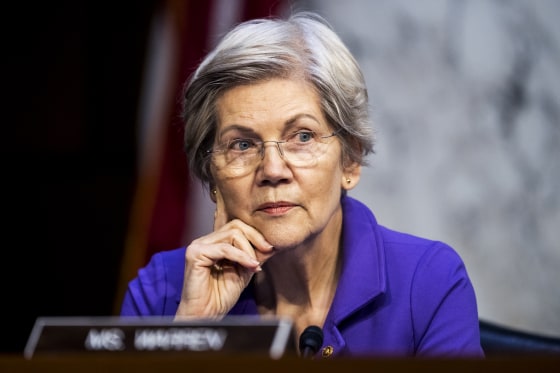
WASHINGTON — Democratic senators plan to introduce legislation Tuesday that would effectively overturn a Supreme Court ruling last month that imposed new limits on federal agencies when they issue regulations about a wide variety of issues, including the environment and consumer protection.
Sen. Elizabeth Warren, D-Mass., will introduce a bill that would restore the previous standard under which federal agencies had some leeway to interpret the law when they issued regulations under statutes that are ambiguously written. It has the backing of nine other Democratic senators, as well as Sen. Bernie Sanders, I-Vt.
"Giant corporations are using far-right, unelected judges to hijack our government and undermine the will of Congress,” Warren said in a statement Tuesday.
The legislation, she said, would “bring transparency and efficiency to the federal rule-making process” and “make sure corporate interest groups can’t substitute their preferences for the judgment of Congress and the expert agencies.”
It is the first piece of legislation about the issue to be introduced since the Supreme Court ruling; Rep. Pramila Jayapal, D-Wash., previously introduced a House measure.
With Republicans in control of the House and generally supportive of the latest Supreme Court decision, it appears unlikely the legislation has much chance of becoming law during this Congress. In addition, a Republican bill that passed the House last year would require congressional approval before any major federal regulations can take effect. That measure has not advanced in the Democratic-led Senate.
"Chevron deference" was the legal rule that existed for decades under the 1984 Supreme Court ruling called Chevron v. Natural Resources Defense Council, which the conservative justices overturned in last month's 6-3 decision.
Conservatives and business interests had long complained about Chevron, saying the ruling gave too much power to unelected bureaucrats.
Liberals defended Chevron because of the flexibility it gave regulators in tackling issues like climate change. They say the Supreme Court, often skeptical of federal regulations, has effectively given itself more power by taking it away from federal agencies.
Dubbed the Stop Corporate Capture Act, the Senate legislation would write Chevron deference into law, undercutting the recent Supreme Court ruling and giving agencies more wiggle room to interpret statutes.
It would also bolster agency rule-making power in other ways, with provisions aimed at streamlining the often-lengthy process, which allows industry and other interested groups to submit public comments.
Other provisions seek to defend independent scientific expertise by, among other things, requiring anyone submitting public comments to disclose industry-funded research and any potential conflicts of interest.
The bill is being introduced the same day the House Administration Committee hold s a hearing on how lawmakers have to adapt to Chevron’s being overturned when they write new legislation.
Lawrence Hurley is a senior Supreme Court reporter for NBC News.
- Share full article
Advertisement
Supported by
Salt Lake Awarded 2034 Olympics Under I.O.C. Pressure Over Doping Inquiries
Olympic officials insisted on the right to pull the Games amid U.S. investigations into how the World Anti-Doping Agency handled positive tests for banned substances among Chinese swimmers.

By Jeré Longman Tariq Panja and Michael S. Schmidt
Jeré Longman and Tariq Panja reported from Paris.
The International Olympic Committee awarded the 2034 Winter Games to Salt Lake City on Wednesday only after a last-minute demand that the agreement shield global sports authorities from U.S. investigations into doping by Chinese athletes.
Organizers of Salt Lake City’s bid and Gov. Spencer J. Cox of Utah agreed to the changes sought by the I.O.C. The unexpected twist came amid an escalating dispute between the global antidoping agency and its American counterpart, and at a time when the Justice Department and Congress are looking into why Chinese swimmers who tested positive for performance-enhancing drugs three years ago were not subject to penalties from the World Anti-Doping Agency.
Mr. Cox told I.O.C. members before Wednesday’s vote awarding the 2034 Olympic and Paralympic Winter Games to Salt Lake City that he would “work with the levers of power,” including in Congress, to “alleviate your concerns.”
The announcement brought fully into the open a festering clash within the sports world over reports of Chinese doping, the adequacy of the response and aggressive efforts by the United States to combat it.
Critics of the I.O.C. and the antidoping agency, known as WADA, said they saw the developments as a blatant effort to cover up both a pattern of suspicious activity in the Chinese swimming program and the unwillingness of WADA to confront it.
“It is shocking to see the I.O.C. itself stooping to threats in an apparent effort to silence those seeking answers to what are now known as facts,” said Travis Tygart, the chief executive of the United States Anti-Doping Agency, which has been in an increasingly open battle with WADA over policing the use of banned substances.
“It seems more apparent than ever that WADA violated the rules and needs accountability and reform to truly be the global watchdog that clean athletes need,” Mr. Tygart said in a statement.
The New York Times revealed in April that 23 elite Chinese swimmers tested positive for the same powerful banned substance seven months before the Tokyo Olympic Games in 2021. The Times found that the swimmers were allowed to escape public scrutiny and continue to compete after top Chinese officials secretly cleared them of doping and that WADA chose not to intervene despite evidence that appeared to undercut the Chinese argument that the swimmers were blameless.
The Times subsequently reported that three of those 23 swimmers had tested positive several years earlier for a different performance-enhancing drug and had escaped being publicly identified and suspended in that case as well.
The F.B.I. and Justice Department have opened a criminal investigation into how the Chinese positive tests were handled, and agents working on that investigation tried to question a top swimming official when he was in the United States last month for the U.S. Olympic trials, triggering alarms in global sports circles about the potential legal risks from the inquiries.
In response, WADA officials have moved a meeting scheduled to be held in the United States later this year to Canada, ensuring that its officials cannot be questioned by the American authorities. Along with the criminal investigation, Congress — which contributes a major portion of WADA’s budget — has at least two committees investigating the Chinese positives and has threatened to withhold financing if it does not receive answers to its questions.
WADA’s president, Witold Banka, declined an invitation to a congressional hearing in June that sought to find answers to how the Chinese swimmers were able to bypass regular antidoping rules. The subcommittee holding the hearing made a point of leaving his seat empty.
In finalizing the award of the 2034 Games to Salt Lake City on Wednesday, days before the opening of the Paris Games, several Olympic committee officials, while praising Salt Lake City’s bid, expressed anger at the investigations by the U.S. authorities.
John Coates, the I.O.C.’s top legal official, said that the organization had altered the signed hosting agreement to grant it the right to “terminate Olympic host city contracts in cases where the supreme authority of the World Anti-Doping Agency in the fight against doping is not fully respected or if the application of the world antidoping code is hindered or undermined.”
Salt Lake City officials confirmed that they had agreed to the changes and signed a revised agreement.
Gene Sykes, chairman of the board of the United States Olympic and Paralympic Committee, said the change in the Salt Lake City bid contract was not meant to undermine the ongoing federal investigations into the Chinese swimming case, the U.S. Anti-Doping Agency or an American doping law that can subject conspirators to criminal penalties at international sports competitions that involve athletes from the United States.
“I think everyone is committed to making WADA as strong as possible, no one more so than the U.S.O.P.C.,” Mr. Sykes said in an interview on Wednesday. “We believe that all of what’s happened over the past several months is a constructive step toward making WADA stronger.”
The clash over policing doping largely overshadowed the celebration of the winning bid for the 2034 Games by Salt Lake City, where a brazen bribery scandal before the 2002 Winter Olympics helped change the way host cities are chosen.
Fraser Bullock, the Salt Lake City bid’s leader, said the demand from the I.O.C. to change the contract came as a surprise.
“We’ve been on this wonderful journey for 22 years and then out of the blue something new comes up, which was completely unexpected, was not directly our problem but our country’s problem.” he said. “And as we look at this issue I’m very sympathetic to how the international sport federations feel. Because they’re worried, ‘Can I come to the U.S. safely?’”
Governor Cox said that he and Salt Lake officials will return to the United States and start working on the promises made to the I.O.C. in Paris.
“We will work very closely with the Department of Justice, we will work with the Senate, we will work with the Biden administration and whatever the next administration is so that we can get a comfort level in what we are going to do to work together because the United States cannot clean up sport by itself — that’s impossible.”
I.O.C. officials did not hold back on their criticism or their expectation that the delegation from Utah would deliver on its promises. John Coates, the I.O.C.’s Australian vice president, told Salt Lake officials that promises they had made in Paris were being recorded and that in the IOC’s world spoken words would be considered just as watertight as contracts.
But it is not clear that Mr. Cox or other members of the Salt Lake City bid team will have any influence over the Justice Department, which is charged with upholding the law against doping at international events where Americans are competing, or Congress, where both parties share various degrees of skepticism toward China and WADA.
“It speaks volumes that the I.O.C. would demand a one-sided contract condition to protect WADA rather than work together to ensure it is fulfilling its mission to protect clean sport,” said a joint statement from Representative Cathy McMorris Rodgers, Republican of Washington and the chair of the House Energy and Commerce Committee, and Representative Frank Pallone of New Jersey, the senior Democrat on the panel.
“The eyes of the world are about to turn toward the Paris Olympics where athletes should be able to compete on a level playing field, but unfortunately these reports cast further doubt on WADA,” their statement said.
Jenny Vrentas contributed reporting from Paris.
Jeré Longman covers international sports, focusing on competitive, social, cultural and political issues around the world. More about Jeré Longman
Tariq Panja is a global sports correspondent, focusing on stories where money, geopolitics and crime intersect with the sports world. More about Tariq Panja
Michael S. Schmidt is an investigative reporter for The Times covering Washington. His work focuses on tracking and explaining high-profile federal investigations. More about Michael S. Schmidt
Democrats Push US Senate Bill to Reverse Supreme Court Ruling Curbing Agency Power

FILE PHOTO: A view of the U.S. Supreme Court in Washington, U.S. June 29, 2024. REUTERS/Kevin Mohatt/File Photo
By Nate Raymond
(Reuters) - Democratic U.S. senators on Tuesday introduced a bill designed to undo a ruling last month by the U.S. Supreme Court that curtailed the ability of federal agencies to issue regulations addressing issues including the environment, consumer protection and workers' rights.
Senator Elizabeth Warren of Massachusetts said she and 10 fellow Democrats are sponsoring a bill that would codify into law a 40-year-old legal doctrine that the U.S. Supreme Court scrapped that had required courts to defer to federal agencies' interpretations of the laws they administer when those statutes are ambiguous.
The Stop Corporate Capture Act would restore the doctrine, known as "Chevron deference," and make a series of other changes that Democrats say would modernize and streamline the rulemaking process.
Warren in a statement said the bill would "make sure corporate interest groups can’t substitute their preferences for the judgment of Congress and the expert agencies."
The bill has slim chances of passing in an election year in the Senate, which Democrats only narrowly control. A similar bill backed by Representative Pramila Jayapal, Democrat of Washington, is pending in the U.S. House of Representatives.
That chamber is led by Republicans, who welcomed the June 28 decision by the Supreme Court's 6-3 conservative majority overruling the doctrine the court established in a 1984 ruling called Chevron v. Natural Resources Defense Council.
Chief Justice John Roberts wrote that instead of deferring to agencies' interpretations of ambiguous statutes, courts "must exercise their independent judgment in deciding whether an agency has acted within its statutory authority."
The Supreme Court's decision was one of a number in its last term that weakened the power of administrative agencies, a longtime goal of Republicans.
In the weeks since the decision, at least six lower-court judges appointed by Republican presidents have cited the Supreme Court's holding in a series of rulings blocking rules adopted during Democratic President Joe Biden's administration designed to protect workers' and LGBTQ rights.
"There were a fair number of cases in which judges were sitting on decisions until the fate of Chevron was determined," said Michael Drysdale, a lawyer at the law firm Dorsey & Whitney who specializes in environmental and administrative law. "So now there is a burst of activity."
The first of those decisions hit within just hours of the Supreme Court's decision, when a federal judge in Sherman, Texas, blocked a U.S. Department of Labor rule from being enforced against the state that would extend mandatory overtime pay to new classes of workers.
That decision was followed by rulings by judges in Florida, Kansas, Mississippi, and Texas blocking new Biden administration rules designed to protect LGBTQ people from discrimination in healthcare and education and a Federal Trade Commission rule banning non-compete agreements.
Most recently, the New Orleans-based 5th U.S. Circuit Court of Appeals on Thursday directed a Texas judge to reconsider an earlier ruling that relied on Chevron deference to uphold a Biden era rule from the U.S. Labor Department that allows socially conscious investing by employee retirement plans.
(Reporting by Nate Raymond in Boston, Editing by Alexia Garamfalvi and Andrea Ricci)
Copyright 2024 Thomson Reuters .
Join the Conversation
Tags: environment , United States
America 2024

U.S. News Decision Points
Your trusted source for the latest news delivered weekdays from the team at U.S. News and World Report.
Sign in to manage your newsletters »
Sign up to receive the latest updates from U.S News & World Report and our trusted partners and sponsors. By clicking submit, you are agreeing to our Terms and Conditions & Privacy Policy .
You May Also Like
The 10 worst presidents.
U.S. News Staff Feb. 23, 2024

The Best Cartoons on Donald Trump
July 25, 2024, at 12:44 p.m.

Joe Biden Behind The Scenes
July 25, 2024
Harris Condemns Flag Burning Protesters
Cecelia Smith-Schoenwalder July 25, 2024

The Politics of the 2024 Paris Olympics
Alan Kronenberg July 25, 2024

Trump, Harris Draw Attack Lines

READ: Biden’s Withdrawal Speech
U.S. News Staff July 25, 2024

How Veepstakes Have Evolved Over Time
Philip Klinkner July 25, 2024

Economy Surges Pre-Election
Tim Smart July 25, 2024

Biden Pledges to ‘Pass the Torch’
Lauren Camera July 24, 2024

Where Extraordinary Adventures Begin
The N&J Difference
Since 1949, Northrop & Johnson has remained the authority on yachting and is recognized as the leading global yacht brokerage offering 360-degree yachting services in the purchase, sale, management, construction and charter of superyachts and luxury boats over 98′ (30m). We are devoted to delivering extraordinary services and world-class experiences for our clients.

Discover luxury yachts for sale at Northrop & Johnson. From power boats to sailing yachts, explore our exclusive listings and find your perfect vessel with expert guidance from our brokers.

Your wanderlust knows no bounds as you cruise across the globe to your dream destination at the hands of an experienced crew dedicated to fulfilling your every need.

Your yacht is undoubtedly one of your most prized possessions. Your Northrop & Johnson broker will find you the right buyer at the best price possible in the shortest period of time.

Everything you need is in one place to maximize your superyacht ownership experience. We work with you to get the best out of your experience from Charter Marketing and Sales Management to Crew Services, Insurance and Marketing.

Our crew services experts specialize in accurately placing crew members on the appropriate yachts and guiding the successful careers of tens of thousands worldwide.
Discover the Ultimate Yacht Charter
Experience the pinnacle of yachting with Northrop & Johnson, where our experts are committed to orchestrating your ultimate yacht charter adventure.

The Northrop & Johnson Difference
Honesty, integrity and extraordinary results.
From yacht sales, yacht purchase and new construction to yacht charter, charter management and crew placement, Northrop & Johnson is a full-service luxury yacht brokerage. Our expert team of sales brokers, charter brokers, charter managers, crew placement and staff are dedicated to fulfilling all of your yachting desires and demands. Northrop & Johnson has brokerage offices strategically placed in yachting hubs around the world, ensuring access wherever you cruise.
Northrop & Johnson prides itself on creating extraordinary yachting experiences by surpassing all expectations at every opportunity.
Our Sales Record
Extremely adept in finding the right buyer or yacht for a client, our impressive sales record showcases the level of expertise by our brokers and staff.

Offices From Coast to Coast
Northrop & johnson has 13 locations around the world.
From the bustling cities of the Americas to the historic waterways of Europe and the exotic ports of Asia, Northrop & Johnson stands as a truly global leader in superyacht marketing. Regardless of your location across the globe, you are guaranteed access to our unparalleled expertise and services. With strategic positions in key destinations worldwide, we are equipped and ready to assist you at any moment, in any place.
Featured Yachts for Sale
Featured yachts for charter.

Stay informed on all things yachting and luxury lifestyle with the bi-monthly Navigator newsletters.

Northrop & Johnson partners with leading yacht builders, designers, and suppliers globally. Our expert brokers facilitate seamless custom yacht construction, guiding owners through every step, from selecting the right shipyard to legal details. With established relationships in the industry, we promise a flawless process from start to finish.

From negotiating prices and contracts to coordinating surveys and sea trials, to providing support with ownership structures and legal matters, Northrop & Johnson’s brokers are skilled in all facets of yacht buying. You can expect a smooth purchase experience from start to finish, leaving you to enjoy the pleasures of stress-free yacht ownership.

Experience the world’s most captivating yachting destinations with Northrop & Johnson. From the Caribbean to the Mediterranean, Southeast Asia to Alaska’s fjords, unlock the perfect adventure aboard a luxury charter yacht.

Experience the most customizable on-water holiday available with a yacht charter. After choosing your destinations your charter broker will work with you to personally perfect your itinerary. Browse our sample itineraries to see what’s possible.

At Northrop & Johnson, we partner with the world’s leading yacht builders, manufacturers and refit facilities to offer top-of-the-line brokerage yachts for sale. Explore our index to view boats by builder.

Explore the latest updates in brokerage, new builds, charter, automotive, lifestyle, travel, and beyond. Navigator News serves as your gateway to stay informed with pertinent Northrop & Johnson updates.

Ready to Embark?
Let's Start Planning
Northrop & Johnson’s superyacht charter experts have in-depth knowledge of worldwide destinations and in-person relationships with the captains and crew of all yachts in our global fleet. Completely private, and with endless luxurious amenities, a yacht charter is the ultimate vacation. Check out our Luxury Yacht Charter Guide to get started.
Superyacht News
Proud to be part of the MarineMax family
© 2024 Northrop & Johnson
- Skip to primary navigation
- Skip to main content
- Skip to primary sidebar
- Skip to footer
Crime & Courts | Fisheries | Southwest
Supreme Court’s trawl bycatch case casts a wide net
July 23, 2024 by Meg Duff, KDLG - Dillingham

A recent U.S. Supreme Court decision could have important implications for fisheries in Alaska.
Last month, the Supreme Court overturned a legal principle called Chevron deference. For 40 years, that principle gave federal agencies wide authority to interpret the gray area in laws passed by Congress. Now, more of that authority will go to judges.
The decision came after a legal battle over who should pay for bycatch monitors on trawl boats. The potential effects extend to all federally regulated industries — including fisheries.
Many trawl boats are required to have bycatch observers onboard. And in Alaska, the North Pacific Fisheries Management Council can have trawl boats pay for those observers. That’s the law. It’s spelled out in the Magnuson-Stevens Act, which governs commercial fishing.
But that act is not clear on who should pay for bycatch observers elsewhere. In the Atlantic, a federal agency created a similar funding program and a trawling business sued.
“And so (the National Marine Fisheries Service) used its agency authority to interpret the statute and fill in the gap and say, ‘Well, you know, we’re going to do what we do in the North Pacific region here in the Atlantic region.’ And the court said, ‘Nope, you can’t do that,’” said Anna Crary, an environmental lawyer at the firm Landye Bennett Blumstein LLP in Anchorage. She’s been watching that court case.
That Supreme Court decision, in a case known as Loper Bright, was a reversal. Forty years ago, in an environmental lawsuit called Chevron vs. Natural Resources Defense Council, the Supreme Court established a legal doctrine known as Chevron deference.
That doctrine said that when federal laws are vague, federal agencies should fill in the gaps, and courts should defer to the expertise of those agencies. Crary says that understanding of agency power has become a baseline assumption.
“Administrative law, unbeknownst to many people, really forms the backbone of what we perceive as our everyday life, as modern society. But the extent to which this decision destabilizes that, I think is quite profound,” Crary said.
Now, legal analysts say it will be easier to challenge federal agency decisions — and to win. Crary says that challenges could play out in the agencies that set safety standards for everything from drugs to airplanes. It could also make regulations by the North Pacific Fisheries Management Council or the National Marine Fisheries Service easier to challenge.
Crary is also watching for challenges to decisions by the Federal Subsistence Board, which carries out subsistence fishing rules under ANILCA. And, she thinks the ruling could give a boost to lawsuits that challenge the very existence of that board, since it was created by agency regulation and not by law.
“It’s not just the time, place and manner regulations, but it’s the actual regulations creating the Federal Subsistence Board itself. I think we will probably see a challenge to those regulations that follows the blueprint of what the Supreme Court laid out here in Loper Bright,” Crary said.
Crary says the impact of the loss of Chevron deference will depend on the context, “Chevron was, you could use it as a sword, you could use it as a shield.”
In Alaska, questions about how much power federal agencies have are important for all sorts of projects that could impact salmon habitat. Siobhan McIntire is a lawyer at Trustees for Alaska, whose work includes lawsuits opposing Pebble Mine, which many Bristol Bay fishermen see as a threat to salmon.
“If we’re, for example, in a plaintiff’s posture and holding agencies accountable, the overturning of deference to agencies could be positive for our clients. On the other hand, if we’re in defensive posture, seeking to uphold an agency action, then the opposite could be true,” McIntire said.
McIntire said it’s too soon to say what impact last month’s Supreme Court ruling will have on Pebble Mine or in other lawsuits.
“This decision really cuts both ways, and we can’t project into the future as to what that will look like from here,” McIntire said.
Under the Dunleavy administration, the State of Alaska has been fighting a number of federal agency decisions, including a decision by the Environmental Protection Agency to block Pebble Mine.
Commissioner John Boyle, a Dunleavy appointee, leads the Alaska Department of Natural Resources. He says they are starting to look at what the ruling could mean for a variety of legal challenges.
“We can really look at that in the context of looking at environmental laws that have been passed, the Endangered Species Protection Act, the Clean Water Act, the Clean Air Act, etc. The onus is really now on Congress to be more specific in what they want the agencies to do,” Boyle said.
Boyle said Loper Bright might reinvigorate the state’s effort to limit which streams and lakes are subject to federal wetland protection under the Clean Water Act. That’s the law that the EPA used to block Pebble Mine.
“What may or may not constitute a water of the United States becomes a very big deal again, because it can be the difference between being able to see a successful development project move forward or not. So the state has been very interested to better define and narrowly tailor what constitutes a water of the United States to remove as much federal entanglement as we possibly can,” Boyle said.
The Loper Bright decision will also require judges to decide more highly specific and technical questions. Boyle said maybe that’s a good thing.
“So it will cause uncertainty, there’s no question about it. And I’m sure there’s going to be all kinds of new litigation and all kinds of new case law that’s going to feed into to what extent does a court defer to a federal agency but I don’t think reining in the powers of federal agencies in particular is necessarily a bad thing at this juncture,” Boyle said.
Loper Bright is not the only recent Supreme Court case to limit federal agency power. In 2022, West Virginia v. The Environmental Protection Agency also limited how agencies could interpret laws in a way that echoes the reversal of Chevron deference. Another ruling this summer, Corner Post v. Federal Reserve, makes it possible to challenge federal agency decisions for longer. Both of those rulings may also impact fisheries.
KDLG - Dillingham
KDLG is our partner station in Dillingham. KTOO collaborates with partners across the state to cover important news and to share stories with our audiences.

Sign up for The Signal
Top Alaska stories delivered to your inbox every week
Social media
Facebook Twitter YouTube Instagram
Public Media
- Gavel Alaska Media Use Policy
Share on Mastodon
- Compare Model Line
- Most Value Towboat
- Deep V Hull
- Wakeboard Wave
- Fuel Efficiency
- Supreme Smiles
- Find a Dealer
- Factory Tour
- Download Catalog
- Supreme Gear
- The Supreme Life
- Team Supreme
Get the best pricing of the year!
Choose your supreme.

Surf Wake Ride Repeat
At Supreme we are committed to making boats that enable you to surf, wake, ride and repeat without worry or concern. We’re committed to making life better by elevating the towboat ownership experience. We see Supreme boats as an investment in a family’s joy, peace of mind and ultimately, a tool for positive change in their lives. With that in mind, it is our responsibility to handle each boat and each buyer with extreme care. We do that so you have only one task to do – have fun! This is a company with a passion for building boats. As our customer, you are like family, and we want only the best for our families.
Surf wake ride. See why supreme is the most valuable towboat
Supreme Boats is the Most Valuable Towboat (MVT) ever made. See why our surf and wake boats have the most value than any other towboat on the market.
Supreme is not just making boats but making lives better
At Supreme, we desire to help people from all walks of life experience positive change in, on and related to water. Making life better is what we are called to do, but it is your extension of that charge that truly makes the movement.
We're a Correct Craft Company
Celebrating 98 years of excellence in the marine industry, Correct Craft is a Florida-based company with global operations. Focused on “Making Life Better,” the Correct Craft family includes Nautique, Centurion, Supreme, Bass Cat, Yar-Craft, SeaArk, Parker, and Ingenity boat companies, Pleasurecraft Engine Group, Indmar Marine Engines, Velvet Drive Transmissions, Mach Connections, Merritt Precision, Osmosis, Watershed Innovation, and Aktion Parks. For more information, please visit www.correctcraft.com
Latest News

Centurion and Supreme Boats Welcomes New Owner to Existing Dealership

Centurion and Supreme Boats Welcomes New Dealer – Elk Rapids Marina

Centurion and Supreme Welcomes New Dealer – Elite Watersports of Oklahoma
Design your dream boat online, or visit one of our dealers.
Supreme boats offer waves and wakes that scale smoothly from first-timer to professional. These championship wake surfing boats also offer customizable cool that allows you to showcase your individual style and turn every head at the dock doing it.
> BUILD YOUR OWN
> find a dealer, > schedule a test ride, > download catalog.
- Alaska Insight
- Watch KAKM Live
- Indie Alaska
- Ways to Watch
- There is Hope
- AK Passport
- In My Family
- KSKA Schedule
- Hometown, Alaska
- Listen to KSKA Live
- All Radio Programs
- Outdoor Explorer
- Addressing Alaskans
- State of Art
- Alaska Economic Report
- Hear me now
- Military Voices
- One Small Step
- Alaska Morning News
- Talk of Alaska
- Alaska News Nightly
- Traveling Music
- Black History in the Last Frontier
- Latest News
- Environment
- Mental Health
- Rural Health
- Alaska Legislature
- Washington, D.C.
- Public Safety
- ANCSA, 50th Anniversary
- Midnight Oil
- Daily Digest
- AKPM Community Education Engagement
- Race Matters
- Ready to Learn
- Library Explorers
- Molly of Denali
- Learning Media
- Parent Resources
- Watch PBS KIDS
- Workforce Development
- Ways to Give
- Benefits of Membership
- Together We Are Stronger
- AKPM Merchandise
- E-Newsletters
- Organization
- Public Documents
- Public Meetings
- Accessibility Commitment
- Donor Portal

The Supreme Court’s ‘Chevron deference’ decision casts a wide net

A recent U.S. Supreme Court decision could have important implications for fisheries in Alaska.
Last month, the Supreme Court overturned a legal principle called Chevron deference, named after the case that established it. For 40 years, that principle gave federal agencies wide authority to interpret the gray area in laws passed by Congress. Now, more of that authority will go to judges.
The decision came after a legal battle over who should pay for bycatch monitors on trawl boats. The potential effects extend to all federally regulated industries — including fisheries.
Many trawl boats are required to have bycatch observers onboard. And in Alaska, the North Pacific Fisheries Management Council can have trawl boats pay for those observers. That’s the law. It’s spelled out in the Magnuson-Stevens Act, which governs commercial fishing.
But that act is not clear on who should pay for bycatch observers elsewhere. In the Atlantic, a federal agency created a similar funding program and a trawling business sued.
“And so (the National Marine Fisheries Service) used its agency authority to interpret the statute and fill in the gap and say, ‘Well, you know, we’re going to do what we do in the North Pacific region here in the Atlantic region.’ And the court said, ‘Nope, you can’t do that,’” said Anna Crary, an environmental lawyer at the firm Landye Bennett Blumstein LLP in Anchorage. She’s been watching that court case.
That Supreme Court decision, in a case known as Loper Bright, was a reversal of policy the Court formed in a 1984 environmental lawsuit called Chevron vs. Natural Resources Defense Council.
That doctrine said that when federal laws are vague, federal agencies should fill in the gaps, and courts should defer to the expertise of those agencies. Crary said that understanding of agency power has become a baseline assumption.
“Administrative law, unbeknownst to many people, really forms the backbone of what we perceive as our everyday life, as modern society. But the extent to which this decision destabilizes that, I think is quite profound,” Crary said.
Now, legal analysts say it will be easier to challenge federal agency decisions — and to win. Crary said that challenges could play out in the agencies that set safety standards for everything from drugs to airplanes. It could also make regulations by the North Pacific Fisheries Management Council or the National Marine Fisheries Service easier to challenge.
Crary is also watching for challenges to decisions by the Federal Subsistence Board, which carries out subsistence fishing rules under ANILCA. And, she thinks the ruling could give a boost to lawsuits that challenge the very existence of that board, since it was created by agency regulation and not by law.
“It’s not just the time, place and manner regulations, but it’s the actual regulations creating the Federal Subsistence Board itself. I think we will probably see a challenge to those regulations that follows the blueprint of what the Supreme Court laid out here in Loper Bright,” Crary said.
Crary said the impact of losing Chevron deference will depend on the context.
“Chevron was, you could use it as a sword, you could use it as a shield,” Crary said.
In Alaska, questions about how much power federal agencies have are important for all sorts of projects that could impact salmon habitat. Siobhan McIntire is a lawyer at Trustees for Alaska, whose work includes lawsuits opposing Pebble Mine, which many Bristol Bay fishermen see as a threat to salmon.
“If we’re, for example, in a plaintiff’s posture and holding agencies accountable, the overturning of deference to agencies could be positive for our clients. On the other hand, if we’re in defensive posture, seeking to uphold an agency action, then the opposite could be true,” McIntire said.
McIntire said it’s too soon to say what impact last month’s Supreme Court ruling will have on Pebble Mine or in other lawsuits.
“This decision really cuts both ways, and we can’t project into the future as to what that will look like from here,” McIntire said.
Under the Dunleavy administration, the State of Alaska has been fighting a number of federal agency decisions, including a decision by the Environmental Protection Agency to block Pebble Mine.
Commissioner John Boyle, a Dunleavy appointee, leads the Alaska Department of Natural Resources. He said staff are starting to look at what the ruling could mean for a variety of legal challenges.
“We can really look at that in the context of looking at environmental laws that have been passed, the Endangered Species Protection Act, the Clean Water Act, the Clean Air Act, etc. The onus is really now on Congress to be more specific in what they want the agencies to do,” Boyle said.
Boyle said Loper Bright might reinvigorate the state’s effort to limit which streams and lakes are subject to federal wetland protection under the Clean Water Act. That’s the law that the EPA used to block Pebble Mine.
“What may or may not constitute a water of the United States becomes a very big deal again, because it can be the difference between being able to see a successful development project move forward or not. So the state has been very interested to better define and narrowly tailor what constitutes a water of the United States to remove as much federal entanglement as we possibly can,” Boyle said.
The Loper Bright decision will also require judges to decide more highly specific and technical questions. Boyle said maybe that’s a good thing.
“So it will cause uncertainty, there’s no question about it. And I’m sure there’s going to be all kinds of new litigation and all kinds of new case law that’s going to feed into to what extent does a court defer to a federal agency but I don’t think reining in the powers of federal agencies in particular is necessarily a bad thing at this juncture,” Boyle said.
Loper Bright is not the only recent Supreme Court case to limit federal agency power. In 2022, West Virginia v. Environmental Protection Agency also limited how agencies could interpret laws in a way that echoes the reversal of Chevron deference. Another ruling this summer, Corner Post v. Federal Reserve, makes it possible to challenge federal agency decisions for longer. Both of those rulings may also impact fisheries.
Meg Duff, KDLG - Dillingham
Related articles more from author, for anchorage teens in search of summer work, odd jobs are a profitable niche, rocket suffers ‘irrecoverable damage’ in fire at kodiak spaceport, new juneau statue remembers ‘titanic of the pacific’s’ mythical sole survivor.

- Green Propulsion
- Renewable Energy
- Energy efficiency
- Sustainable materials
- Eco Insights
- News & Events
- Sunreef News Magazine
- Press About Sunreef

- 60 Sunreef Power
- 70 Sunreef Power
- 80 Sunreef Power
- 100 Sunreef Power
- Sunreef Supreme Power
- Sunreef Ultima Range
- Sunreef 44 Ultima
- Sunreef 55 Ultima
- Sunreef 66 Ultima
- Sunreef 77 Ultima
- Sunreef 88 Ultima
- Sunreef fleet

- Sunreef Zero Cat
- Sunreef 100
- Sunreef Fleet

- Sunreef 35M
- Sunreef 43M
- 49M Sunreef Power
- 210 Sunreef Power Trimaran
- Sunreef Explorer
- 40M Sunreef Explorer
- 40M Sunreef Explorer Eco
- 50M Sunreef Explorer
- Superyachts Fleet
Building a future
Of sustainable innovative solar yachting.
Sunreef Yachts is the world’s leading designer and manufacturer of luxury sailing and power multihulls.
Each catamaran, motor yacht, and superyacht built is a bespoke creation. Every yacht is a vision brought to life, thoughtfully designed to deliver luxury, style and comfort.
EXPLORE OUR CATAMARANS
Sailing yachts, power yachts, superyachts, with a 360° approach.
to eco cruising, they offer cutting-edge electric propulsion , naturally-sourced sustainable materials, smart energy management and new technologies including a patent-pending solar skin produced in-house.
Green Propulsion for Eco Catamarans
Renewable energy on yachts, energy efficiency on yachts, sustainable finishing materials.
Equipped with the world’s first and only composite-integrated solar panel system and using the industry’s lightest batteries, the Sunreef Yachts Eco catamarans provide the best of autonomy and energy efficiency for environmentally-conscious luxury cruising.
The Sunreef Yachts Eco harvest power from the sun more efficiently than most solar catamarans. First in the world In-house pattented designed and manufactured by the shipyard, Sunreef Yachts’ solar panels are fully-integrated with the composite bodywork, vastly increasing the amount of solar power generated.
OUR AMBASSADORS
Fernando alonso.
brand ambassador since: September 2021
Two-time Formula 1® World Champion Fernando Alonso commissioned a custom 60 Sunreef Power Eco catamaran with Sunreef Yachts.
brand ambassador since: June 2022
An unstoppable and passionate adventurer, Mike Horn has accomplished a series of groundbreaking expeditions including a legendary solo journey around the equator without motorized transport
LATEST NEWS

Sunreef Super Cat on the Rise: 100 Sunreef Power 2.0 Launched
Sunreef Yachts, the world’s leading luxury catamaran shipyard, proudly announces the 100 S


E1 Team Rafa & Sunreef Yachts Eco
A New Partnership begins Sunreef Yachts Eco joins Rafael Nadal’s E1 team as Official Partner. T

80 Sunreef Power Eco wins the International Yacht & Aviation Award
Sunreef Yachts Eco celebrated a spectacular victory at the International Yacht & Aviation Awa

IYC Appointed as Sunreef Yachts Exclusive Dealer in the UK
Sunreef Yachts is proud to announce a new partnership with IYC, appointing them as the Exclusive

Structural Foam from Recycled PET Bottles Integrated into the Yacht’s Structure
Sunreef Yachts Eco is a comprehensive approach to yachting, aiming to enhance energy efficiency a
Reception Desk +48 58 769 77 77
Marketing +48 502 870 292
Sales Office:
+48 516 149 443 (General)
+34 661 082 145 (ES)
+48 693 920 325 (RU)
+90 532 644 70 21 (TR)
SUBSCRIBE TO OUR NEWSLETTER
- Sailing Yachts
- Power Yachts
- Superyachts
- Making a Change
- Green Concept
- Energy Efficiency
- Sustainable Materials
Copyright © 2024 Sunreef Yachts . All rights reserved.
- Whistleblowing
- Privacy Policy

Sunreef Venture S.A.
Sunreef Yachts Shipyard
ul. Tarcice 6
80-718 Gdańsk, Poland
+48 58 769 77 77
- News & Politics
- Science & Health
- Life Stories
- The New Sober Boom
- Getting Hooked on Quitting
- Liberal Arts Cuts Are Dangerous
- Is College Necessary?
- Dying Parents Costing Millennials Dear
- Gen Z Investing In Le Creuset
- SEC vs Celebrity Crypto Promoters
- 'Dark' Personalities Drawn to BTC
- The Top Online Casinos With Bitcoin
- The Top Sports Betting Sites With Ethereum in 2024
- The Top Betting Apps With Bitcoin
- The Top eSports Betting Sites With Bitcoin in 2024
- The Top Gambling Sites With Bitcoin
Investigation found that Clarence Thomas took free yacht, helicopter trips in Russia: Democrats
Senate democrats asked the attorney general to investigate the "serious possibility of tax fraud", by nicholas liu.
A Senate Judiciary Committee investigation found that conservative Supreme Court Justice Clarence Thomas failed to disclose at least 35 luxury gifts, including a free yacht trip to Russia and a private helicopter to a palace in St. Petersburg, Vladimir Putin's hometown, Sens. Sheldon Whitehouse, D-R.I., and Ron Wyden, D-Or., said in a letter to Attorney General Merrick Garland.
The letter raised the "serious possibility of tax fraud" and accused Thomas of having "secretly accepted gifts and income potentially worth millions of dollars," mostly from billionaire real estate developer Harlan Crow, who Thomas once described as being among his "dearest friends." Buried in appendix list on page 14 are the references to the Russia trips, which took place in 2003. Other gifts from Crow include "multiple instances of free private jet travel, yacht travel, and lodging," "gifts of tuition for Justice Thomas's grandnephew," "real estate transactions," "home renovations," and "free rent for Justice Thomas's mother."
“The Senate is not a prosecutorial body, and the Supreme Court has no fact-finding function of its own, making the executive role all the more important if there is ever to be any complete determination of the facts,” the letter reads.
After a bombshell ProPublica report last year that revealed the extent of Thomas' financial ties with Crow and attempts to hide it, Thomas admitted to taking three trips on a private plane owned by Crow, but did not disclose any of the other gifts.
The senators are asking Garland to launch a special counsel investigation into Thomas, with the evidence collected so far "plainly suggest[ing] that Justice Thomas has committed numerous willful violations of federal ethics and false-statement laws and raises significant questions about whether he and his wealthy benefactors have complied with their federal tax obligations."
In a separate move on Wednesday, Rep. Alexandria Ocasio-Cortez, D-N.Y., and a group of fellow progressives filed articles of impeachment against Thomas and Supreme Court Justice Samuel Alito for failing to disclose "millions of dollars in gifts from individuals with business before the court."
Clarence Thomas Took Free Yacht Trip to Russia, Chopper Flight to Putin’s Hometown: Dems
The allegedly secret gifts were disclosed in a letter from two Democratic senators that accused Thomas of potentially committing tax fraud.

Anna Conkling
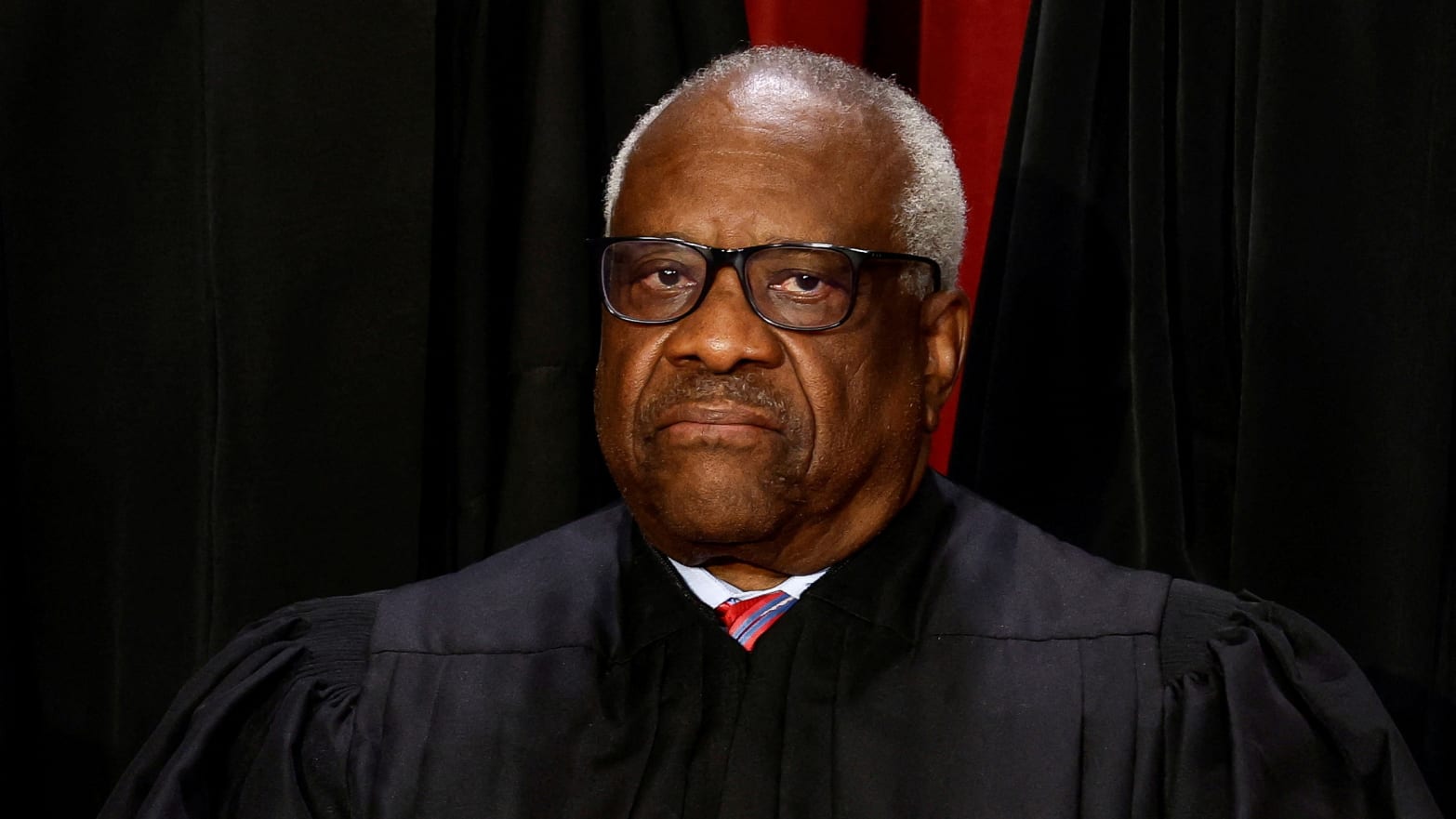
Evelyn Hockstein/Reuters
Supreme Court Justice Clarence Thomas has been accused of not disclosing a yacht trip to Russia and a private helicopter flight to a palace in President Vladimir Putin’s hometown, among a slew of other gifts and loans from businessman Harlan Crow .
Buried on page 14 of a letter that two Democratic senators sent to Attorney General Merrick Garland on Tuesday, in which they urged Garland to appoint a special counsel to probe Thomas, was an astonishing list of dozens of “likely undisclosed gifts and income” from Crow, Crow’s affiliated companies, and “other donors.”
In the letter, Sens. Sheldon Whitehouse (D-RI) and Ron Wyden (D-OR) said Thomas, one of the court’s staunchly conservative justices , even may have committed tax fraud and violated other federal laws by “secretly” accepting the gifts and income potentially worth millions.
“The Senate is not a prosecutorial body, and the Supreme Court has no fact-finding function of its own, making the executive role all the more important if there is ever to be any complete determination of the facts,” reads the letter requesting the appointment of a special prosecutor.
“We do not make this request lightly,” said the letter.
The list of potentially secret gifts also includes a loan of more than $267,000 provided by Thomas’ close friend Anthony Welters, the yacht trip to Russia from the Baltics, and the helicopter ride to Yusupov Palace in St. Petersburg. ProPublica first reported last year on the existence of extensive undisclosed gifts and lavish trips from Crow.
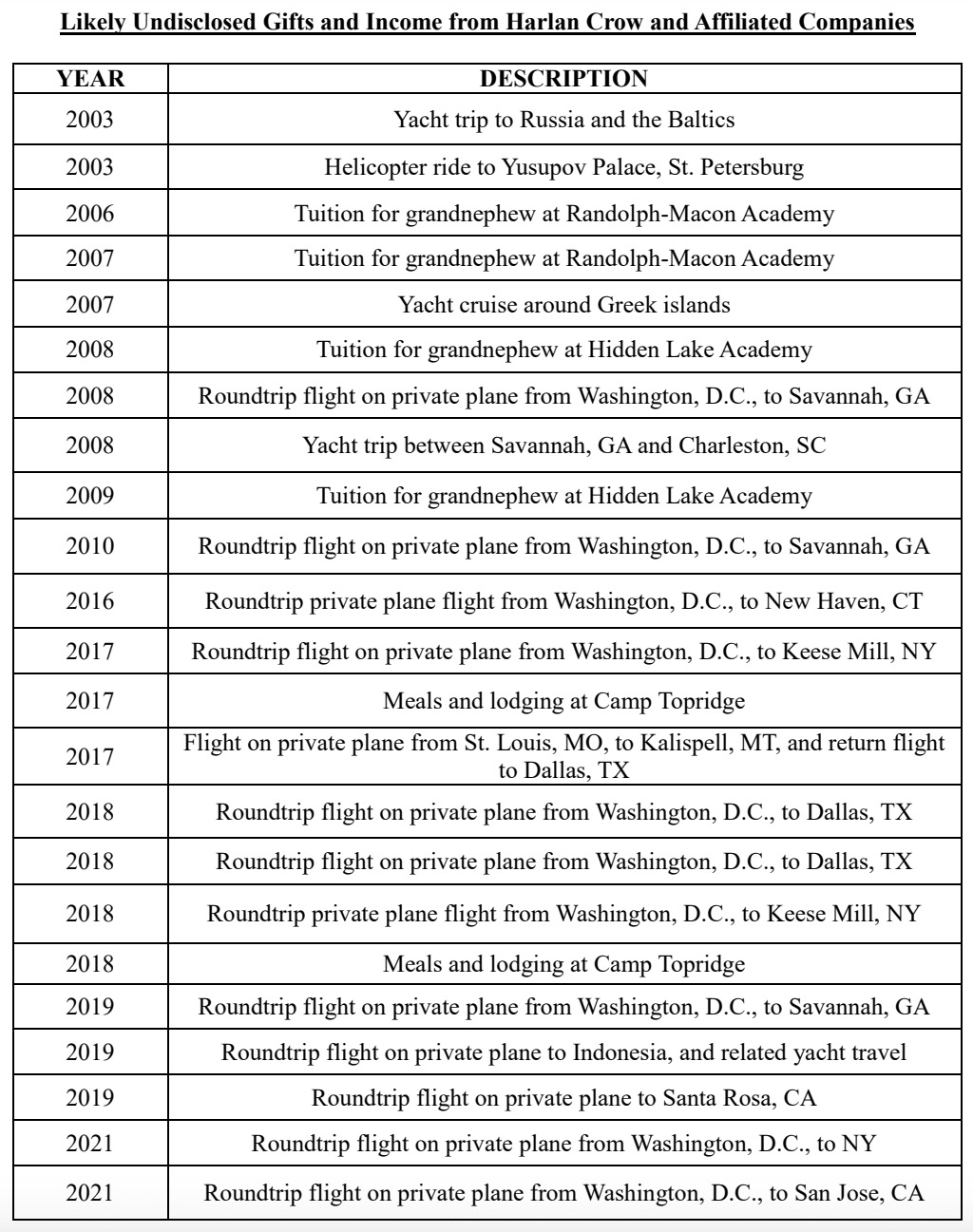
Sens. Sheldon Whitehouse and Ron Wyden
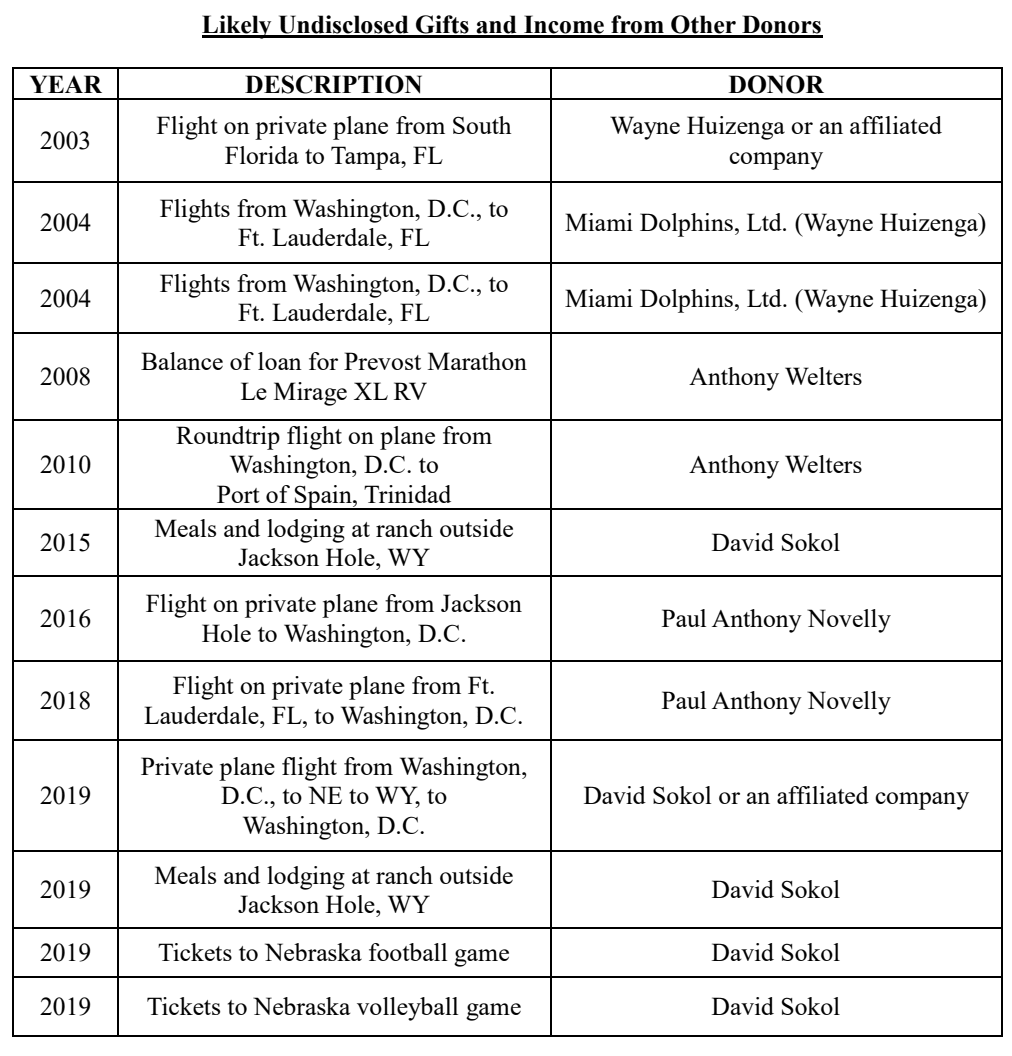
Additionally, Justice Thomas is accused of not disclosing tuitions for his grandnephew, free lodging, real estate transactions, and home renovations. The action escalates Democratic senators’ efforts to hold Thomas accountable for perceived ethics controversies.
According to the senators, Thomas’ conduct could violate the Ethics in Government Act, which requires officials like Supreme Court justices to file annual reports disclosing gifts and income accepted from outside sources.
“It is a crime,” reads the report, “To knowingly and willfully fail to file or report such information.”
Since 2023, two Senate committees have been looking into the 1991 loan from Welters that was connected to Thomas’ purchase of a luxury motor home. Welters previously responded to a New York Times request for comment on the loan only to say that it was “satisfied.”
Thomas, for his part, belatedly disclosed some—but not all—gifts from Crow this year and has defended the gifts as “personal hospitality” from some of his and his wife’s “dearest friends.”
“The evidence assembled thus far plainly suggests that Justice Thomas has committed numerous willful violations of federal ethics and false-statement laws and raises significant questions about whether he and his wealthy benefactors have,” Whitehouse and Wyden wrote.
Got a tip? Send it to The Daily Beast here .
READ THIS LIST
- Brokerage New Construction How to Buy How to Sell
- Yacht Fleet Yacht Catalog Charter Marketing Destination Guides
- Financial Services Payroll & Accounting Payroll Service Process Logistical Support Admin Services Crew Admin
- Job Descriptions Crew FAQ
- About Sitemap
36M MAMMA MIA NOW AVAILABLE FOR CHARTER
Luxury Yacht Group is pleased to welcome Mamma Mia to our charter fleet. Available for charters in the Caribbean and Bahamas.
40M ALEGRE NOW AVAILABLE FOR CHARTER
Luxury Yacht Group is pleased to welcome 40m Alegre to our charter fleet. Available for charters this Winter in the Caribbean and Bahamas.
THE ULTIMATE YACHTING EXPERIENCE
Luxury Yacht Group has global resources to build, sell, charter and crew your yacht. Understanding that every happy yacht starts with a competent crew our resources focus on your crew and how they impact your yachting enjoyment.
CHARTER WITH LUXURY YACHT GROUP
Luxury Yacht Group represents the finest yachts for charter around the world.
WE SUPPORT YOUR YACHT
We operate some of the best run yachts and work hard to support them with sensible shore based solutions. From basic payroll services to full service regulatory compliance we have the expertise to be sure that your yacht operates effectively.
THE BEST CREW HAVE DISCOVERED LUXURY
Luxury Yacht Group operates the largest crew agency with agents on three continents providing almost 24/7 coverage. The best crew have discovered Luxury.

New Construction
There is nothing more exciting than building your new yacht. We follow every detail and deliver on those details.

A simple guide on the process of buying a yacht.

How to Sell
A simple guide on how to sell your yacht.

Why Charter with Luxury Yacht Group?
We book the finest yachts around the world. Our charter brokers know the yachts and most importantly their crew. We go the extra mile to be sure that your vacation is truly memorable.
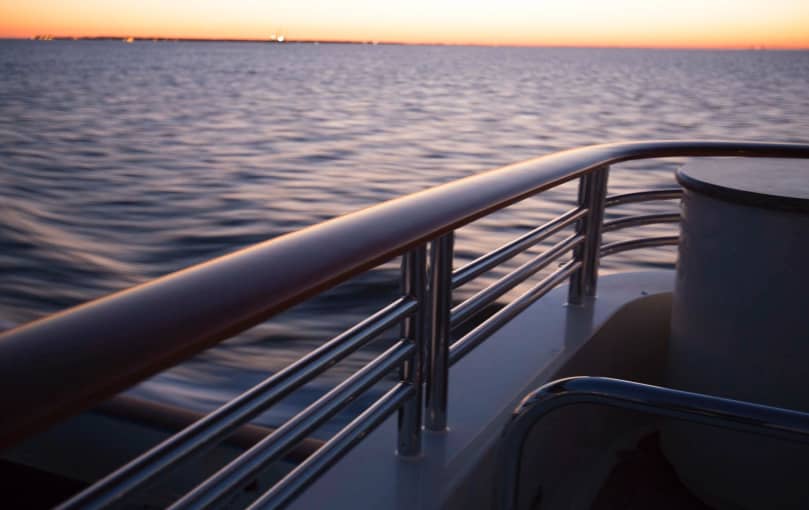
Our Charter Marketing Expertise
Our team of marketing professionals will generate the best possible net income for your yacht. We have experience marketing yachts priced from $40-$700,000 per week.

Featured Yachts
We can book all yachts worldwide but have curated a selection of our favorites here for you to review.

Featured Destinations
We have prepared itineraries for some of the finest charter destinations around the world.
Shore Support Services

Payroll & Accounting
We are experienced in accounting for yacht operations and crew payroll, providing streamlined, hassle-free payroll, contracts, and health insurance operation for yacht owners worldwide.
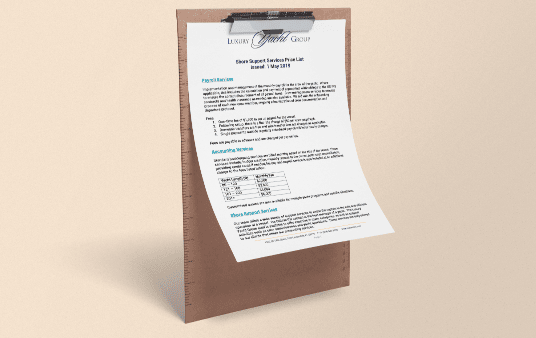
Support services have clear and simple pricing. Please review our offerings and their pricing here. We offer straightforward services and don't believe that you should have to enter into a big negotiation over the support service your yacht needs.

Document Library
Download library of very useful templates and forms published by Luxury Yacht Group. Go here for templated SEA's, terms and conditions, work lists and other useful "stuff".
Crew Placement
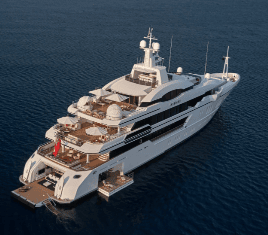
Crew Members
Luxury Yacht Group finds crew work onboard the finest yachts around the world. We place thousands of crew on yachts every year for full time, rotational, seasonal or day work positions.

The best crew have discovered Luxury! With over 140,000 crew registered and over 250,000 references verified Luxury Yacht Group is your “go to” resource for the finest crew to staff your yacht.
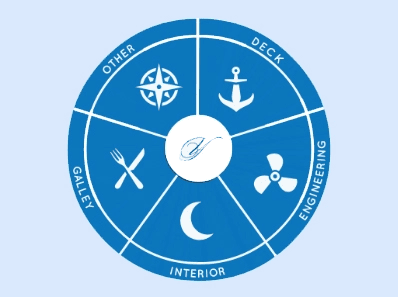
Crew Job Descriptions

PDF Summary Salary Guidelines
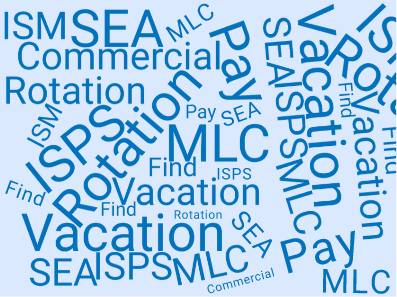
Why Use LYG for Crew Placement
Cost calculator.

Industry leading operating cost calculator tool
Luxury Yacht Group has built a comprehensive and realistic operating cost calculator tool with over 100 fields in the chart of accounts. You can utilize this tool free of charge.
- What the Supreme Court’s Loper Decision Means for the Affordable Housing Industry
Ending 40 years of judicial deference to administrative agencies’ interpretations of ambiguous statutes governing them, the Supreme Court of the United States finally pulled the plug on this experiment that it, just five years earlier, had placed on “life support.” Overruling Chevron v. Natural Resources Defense Council , the Court held that courts should no longer defer to an agency’s interpretation of an ambiguous statute. Instead, according to the Supreme Court in its recent opinion in Loper Bright Enterprises, Inc. v. Raimondo , judges must interpret statutes independently, as it is the province of the courts to determine the law.
The petitioners in Loper , small fishing companies, challenged a rule that required them to pay for monitors to accompany their fishing boats. Lower courts upheld the rule under the Chevron doctrine, which required a two-step framework: (1) if a court finds a statute ambiguous, then (2) the court must defer to the agency’s reasonable interpretation, rather than discerning for itself the correct interpretation of Congress’s language. Because it overruled Chevron , however, the Supreme Court sent the case back down to the lower courts to consider the rule without giving the agency any deference.
Penning the Supreme Court’s majority opinion, Chief Justice Roberts began with a constitutional and historical survey of the province of the judiciary. Article III of the U.S. Constitution assigns the power to adjudicate disputes to the federal judiciary, and the Framers structured the Constitution to allow judges to do so independent from political branches’ influence.
Chief Justice Roberts also reviewed the Administrative Procedure Act (“APA”), which prescribes procedures for agency action and delineates the basic contours of judicial review of such action, directing that “the reviewing court shall decide all relevant questions of law, interpret constitutional and statutory provisions, and determine the meaning or applicability of the terms of an agency action.” But the APA prescribes no standard for courts to employ in answering those legal questions, even those involving ambiguous laws. Courts fulfill their role by ensuring that agencies engage in reasoned decision-making within the boundaries of their delegated authority.
Thus, the deference that Chevron required of courts reviewing agency action — that is, to defer to the agency if it offers a permissible construction of an ambiguous statute — cannot be squared with the APA. Instead, Chevron forbade the court from exercising its independent judgment to determine what Congress’ language means by demanding deference to agency interpretations, even where they have been inconsistent, and even where judicial precedent holds that an ambiguous statute means something else.
In overruling Chevron , Loper marks the end of an era in administrative law . Now, the public will enjoy a more level playing field when challenging government actions. Chevron had sometimes insulated agency rulemaking from judicial scrutiny, even where the agency relied on a new interpretation of an unchanged statute to implement policy that departed from the historical interpretation and application of the statute. Loper will make it more difficult for an agency to change its legal interpretations of statutes in response to changes in political leadership because the judiciary, not the agency, will determine the statute’s meaning . At the same time, the decision gives some weight to an agency’s statutory interpretations. While Loper clearly instructs courts to exercise independent judgment and not defer to agency rulemaking, an agency’s statutory interpretation may still be considered persuasive based on factors such as whether its interpretation was adopted contemporaneously with the statute’s enactment and its consistency over time.
Impact on Affordable Housing
Similar to other federal agencies, the United States Department of Housing and Urban Development (“HUD”) and Department of Agriculture (“USDA”) rely heavily on federal rulemaking to implement regulations authorized through legislation passed by Congress. Examples of major pieces of legislation that have impacted the affordable housing industry and led to HUD and USDA rulemaking include:
- The Housing Act of 1937 (Wagner-Steagall Act)
- The Fair Housing Act (Civil Rights Act of 1968)
- Low-Income Housing Preservation and Resident Homeownership Act
- Emergency Low Income Housing Preservation Act
- Multifamily Assisted Housing Reform and Affordability Act of 1997
Due to the overturning of Chevron , any rulemaking proposed by HUD or USDA may be more vulnerable to lawsuits than in years past. For instance, many of HUD and USDA’s policies are authorized through the Fair Housing Act, which contains fairly broad and vague language but is often applied by HUD and USDA to implement new federal rules. Proposed rules such as “ Reducing Barriers to HUD-Assisted Housing ,” published on April 10, 2024, changes the requirements for owners of HUD-assisted housing when screening applicants based on prior criminal records. Prior to the Loper decision, a court would have provided deference to HUD’s interpretation of the Fair Housing Act in implementing this proposed rule, but now a court might view HUD’s new screening requirements as an overreach of HUD’s authority under the Fair Housing Act or the Housing Act of 1937. The Loper decision could have an impact on HUD and USDA federal rulemaking in a variety of areas such as eviction procedures, tenant selection, prepayment of Section 515 mortgages, design and construction standards under the Fair Housing Act, and any other federal rules that might be seen as an overreach of agency authority.
AGG’s Affordable Housing team will continue to monitor the industry’s legal reaction to the Loper decision and its impact on federal rulemaking.
Latest Posts
- Government Investigations Team Insights - July 2024
- This is a Land of Confusion: FDA Issues Q&A Guidance on Addressing Misinformation About Medical Devices and Prescription Drugs
- Healthcare Authority Newsletter - July 2024 #2
- Top 10 Legal Considerations for Esports Players and Teams
See more »
DISCLAIMER: Because of the generality of this update, the information provided herein may not be applicable in all situations and should not be acted upon without specific legal advice based on particular situations.
Refine your interests »
Written by:

PUBLISH YOUR CONTENT ON JD SUPRA NOW
- Increased visibility
- Actionable analytics
- Ongoing guidance
Published In:
Arnall golden gregory llp on:.

"My best business intelligence, in one easy email…"

- Contributors
Supreme Court’s Overruling of Chevron Will Invite More Challenges to Agency Decisions
Shay Dvoretzky , Parker Rider-Longmaid , and Boris Bershteyn are Partners at Skadden, Arps, Slate, Meagher & Flom LLP. This post is based on a Skadden memorandum by Mr. Dvoretzky, Mr. Rider-Longmaid, Mr. Bershteyn, Emily J. Kennedy and Steven Marcus .
In the consolidated cases Loper Bright Enterprises v. Raimondo, Secretary of Commerce and Relentless, Inc. v. Department of Commerce , the U.S. Supreme Court overruled Chevron v. NRDC , the 1984 case that established the bedrock Chevron doctrine.
The underlying cases themselves addressed a narrow question of fishery management law: Whether the National Marine Fisheries Service’s (NMFS) requirement that certain vessels pay for federal observers onboard their boats was consistent with the Magnuson-Stevens Act. But embedded in that focused question was a bigger methodological issue: Whether a court adjudicating that administrative law dispute could use the Chevron doctrine, which requires some deference to NMFS’s interpretation, or whether the court should decide the question on its own. The D.C. Circuit and the First Circuit both relied on Chevron U.S.A. Inc. v. Natural Resources Defense Council, Inc. , 467 U. S. 837 (1984) and deferred to NMFS’s interpretation of the Magnuson-Stevens Act.
In a 6-3 opinion, with the majority authored by Chief Justice Roberts, the Supreme Court vacated both of those cases and overruled Chevron . The Court held that Chevron was inconsistent with both the constitutional obligation of courts to say what the law is, and with the Administrative Procedure Act (APA). And the Court held that the stare decisis factors did not support retaining Chevron , which the Court described as grievously wrong from the outset. Going forward, courts “must exercise their independent judgment in deciding whether an agency has acted within its statutory authority.”
In dissent, Justice Kagan defended Chevron as “rooted in a presumption of legislative intent,” and a “rule of judicial humility” that the majority has replaced with a “rule of judicial hubris.”
Loper Bright is likely to have a significant impact on administrative law. It will increase both the number of challenges to agency action and the likelihood of success of those challenges. And the Court’s decision in Corner Post, Inc. v. Board of Governors of the Federal Reserve System this term is likely to magnify those effects, because Corner Post expands the statute of limitations for many APA challenges to agency action. See our July 9, 2024, client alert, “ Supreme Court Opens the Door to More Rule Challenges by Extending Accrual Date for APA Cases .”
Going forward, Loper Bright is a boon for regulated parties, who can now seek to invalidate agency action simply by showing the agency’s interpretation of its statute is not the best one — it is no longer enough for the agency to argue that its interpretation is “reasonable.”
Just how broad Loper Bright ’s new rule is — and its effect on regulations that were previously upheld under Chevron — will no doubt be the subject of future litigation. The majority caveated its decision by saying that it was not automatically overruling prior decisions that relied on Chevron . But challengers likely will argue that those earlier decisions should not be followed given, for example, poor reasoning or unworkability.
The majority also held that the best reading of a statute could be that it delegated discretionary authority to an agency — and a reviewing court must respect that delegation. But whether, and how far, those delegations go will be hotly contested. And that focus on delegation likely will bring the nondelegation doctrine to the forefront, potentially prompting the Supreme Court to address the doctrine head-on. The Court may also have to resolve circuit splits that arise as courts reach differing decisions on the best reading of a statute.
Ultimately, though, overruling Chevron may prompt greater stability in the law, and greater predictability for businesses, as the best interpretation of a statute is less likely than the prior regime’s “reasonable” interpretation to change over time.
The question in Chevron was whether an Environmental Protection Agency regulation was consistent with the term “stationary source” in the Clean Air Act. The regulation defined “stationary source” to include all pollution-emitting devices within the same industrial plant, rather than to refer to each device individually. In upholding the regulation, the Court articulated the two-part approach that became known as the Chevron doctrine.
The first step, the Court instructed, was to ask “whether Congress ha[d] directly spoken to the precise question at issue.” To answer that question, the Court continued, courts should use “traditional tools of statutory construction.” If the “intent of Congress is clear” — if “Congress had directly spoken to the precise question at issue” — the inquiry is over.
But if Congress had not directly addressed the precise question, the Court continued, the reviewing court continues to the second step. The court should not “simply impose its own construction of the statute.” Instead, it should decide whether the agency offered a permissible construction of the statute, even if that construction was not the one the court would have reached if it was analyzing the statute on its own.
Chevron did not mention the Administrative Procedure Act, the landmark 1946 statute that sets out the contours of judicial review of agency action. Section 706 is the heart of the APA; it directs reviewing courts, “[t]o the extent necessary to decision and when presented, [to] decide all relevant questions of law, interpret constitutional and statutory provisions, and determine the meaning or applicability of the terms of an agency action.” It requires a court to “hold unlawful and set aside agency action, findings, and conclusions found to be … not in accordance with law.” 5 U.S.C. §706(2)(A).
Instead, the Court grounded the doctrine in a presumption about Congressional intent: That when Congress uses ambiguous terms in a statute that is meant to be implemented by an agency, Congress intends for the agency (rather than courts) to resolve the ambiguity. See Smiley v. Citibank (South Dakota) N.A., 517 U.S. 735, 740-41 (1996). The Court reasoned that Congress could explicitly or implicitly delegate interpretive and policymaking authority to expert agencies. Thus, the Court reasoned, where a statute was silent or ambiguous, courts were required to defer to the agency’s reasonable policy choice.
Before Loper Bright , the Supreme Court limited Chevron ’s reach in a number of decisions, particularly in recent years. To start, the Court established a threshold requirement for applying Chevron (sometimes called Chevron “step zero”), holding that Chevron applied only when “it appears that Congress delegated authority to the agency generally to make rules carrying the force of law, and that the agency interpretation claiming deference was promulgated in the exercise of that authority.” United States v. Mead , 533 U.S. 218, 226-27 (2001). Most significantly, under the “major questions doctrine,” the Court held that Chevron doesn’t apply at all if the question at issue is one of “deep economic and political significance.” King v. Burwell , 576 U.S. 473, 486 (2015).
History and Proceedings Below
The Magnuson-Stevens Act established eight regional fishery management councils, and required those councils to develop fishery management plans, which NMFS approves and promulgates as final regulations. 16 U.S.C. §§1852(a), (b), (h), 1854(a). The Act allows a fishery management council to require that “one or more observers be carried on board” fishing vessels “for the purpose of collecting data necessary for the conservation and management of the fishery.” 16 U.S.C. §1853(b)(8). In 2020, NMFS approved a plan from the New England Fishery Management Council that required some fisherman to pay for a government-certified observer, at an estimated cost of $710 per day for the fishermen.
Loper Bright Enterprises and Relentless Inc., two fishing businesses subject to the NMFS rule, filed suit under the APA in the D.C. Circuit and the U.S. District Court for the District of Rhode Island, respectively. Both courts applied Chevron and upheld the NMFS rule. (The First Circuit later affirmed the Rhode Island district court opinion.) The courts both concluded at step one that Congress in the Magnuson-Stevens Act had not squarely addressed the issue of paying observers, and held at step 2 that the NMFS’s interpretation was a reasonable construction of the act. Judge Walker dissented from the D.C. Circuit decision, arguing that Congress’s silence about industry-funded observers in the act unambiguously indicated that the NMFS lacked authority to require fishermen to pay for observers. The fishing businesses sought Supreme Court review.
The Supreme Court’s Decision
The Court granted the fishermen’s petition for a writ of certiorari in both cases to decide whether to overrule or clarify Chevron . In a 6-3 decision, the Court overruled Chevron, vacated the decisions below, and remanded to the First and D.C. Circuits to review the NMFS’s construction of the Magnuson-Stevens Act without deference to the agency.
Chief Justice Roberts authored the majority opinion, in which Justice Thomas, Justice Alito, Justice Gorsuch, Justice Kavanaugh, and Justice Barrett joined. Justice Thomas and Justice Gorsuch each authored concurring opinions. Justice Thomas argued that Chevron deference was unconstitutional in violation of Article III, and Justice Gorsuch emphasized that Chevron was inconsistent with the role of judges at common law.
Justice Kagan, joined by Justice Sotomayor and Justice Jackson, dissented, arguing that Chevron was correctly decided, that the stare decisis factors strongly counseled against overruling the doctrine, and that in so doing, the Court arrogated powers to itself — an unelected, inexpert body — and away from agencies with expertise and political accountability.
The Majority Opinion
In the majority’s view, Chevron deference is inconsistent with the role of courts to provide the final interpretation of the law. The Court described that role through founding-era texts like Hamilton’s Federalist No. 78 (the final “interpretation of the laws” would be “the proper and peculiar province of the courts”) and in Marbury v. Madison (“It is emphatically the province and duty of the judicial department to say what the law is.”). And while the judicial branch has a long history of “according due respect to Executive Branch interpretations of federal statutes,” respect means just that — a view that could influence the judiciary’s judgment, but would not supersede it.
That view changed slightly during the New Deal Era, Chief Justice Roberts explained, but the pre- Chevron , pre-APA cases of that time showed deference to “fact-bound determinations” made by agencies, not deference to agencies’ resolution of legal questions. The APA codified that no-deference-on-legal-issues approach, the majority reasoned, by requiring that “the reviewing court shall decide all relevant questions of law, interpret constitutional and statutory provisions, and determine the meaning or applicability of the terms of an agency action.” 5 U.S.C. §706.
The majority explained that Chevron cannot be squared with that history or with the APA. Chevron requires a court to defer — to give binding deference — to agency interpretations that the court disagrees with. The post-hoc justification for Chevron , that Congress uses ambiguity as an implicit delegation to an agency, does not approximate reality; as Chevron itself conceded, sometimes ambiguities result because Congress could not answer the question at hand, or because Congress failed to consider the specific issue altogether.
Nor was the majority persuaded by the need for deference on account of an agency’s expertise, because interpreting statutes falls “more naturally into a judge’s bailiwick than an agency’s.” Moreover, in the majority’s view, “Congress expects courts to handle technical statutory questions,” and they are capable of doing so, especially with the agency’s informed judgment at their disposal.
Having concluded that Chevron was wrong, the majority defended its overruling by discussing the stare decisis factors. The Court explained that Chevron was fundamentally misguided and that the doctrine was unworkable at both steps. Courts have never come to a meaningful definition on the concept of ambiguity, and if the doctrine requires courts to decide the bounds of a reasonable interpretation of a statute, a court can just as well decide the best reading of a statute.
The Chief Justice also pointed to all the “refinements” the Court had needed to make to Chevron to keep it workable, quipping that those efforts had “transform[ed] the original two-step into a dizzying breakdance.” In addition, the Court reasoned that Chevron “destroy[ed]” reliance interests by licensing “an agency to change positions as much as it likes.” The Court observed that it had last afforded Chevron deference to an agency interpretation in 2016 and that the lower courts were relying on Chevron less and less.
The Court noted several limits of its holding:
- Although courts must now decide legal questions themselves without deference to agencies, some statutes may delegate authority to agencies. For example, the Court noted that Congress sometimes delegates “to an agency the authority to give meaning to a statutory term.” “[W]hen a particular statute delegates authority to an agency consistent with constitutional limits, courts must respect the delegation, while ensuring that the agency acts within it.”
- Ensuring that an agency acts within delegated authority means marking the boundaries of that authority and “ensuring that the agency has engaged in reasoned decisionmaking within those boundaries.”
- The Court stated that it was “not call[ing] into question prior cases that relied on the Chevron framework,” instructing that decisions upholding “specific agency actions” as lawful “are still subject to statutory stare decisis despite [the Court’s] change in interpretive methodology.” The Court explained that “[m]ere reliance on Chevron cannot constitute a ‘special justification’ for overruling” such decisions.
Justice Thomas’s Concurrence
Justice Thomas issued a solo concurrence reiterating his view that Chevron is unconstitutional because it curbs the judicial power afforded to courts in Article III and aggrandizes agencies’ power afforded to the executive in Article II. Justice Thomas emphasized that the Constitution mandates that “only the vested recipient of [constitutional] power can perform it,” so the legislative branch alone can exercise legislative power, and so on with the executive and judicial branches. Chevron disturbed that balance by permitting the executive to exercise judicial powers. And, he continued, defending Chevron deference as a delegation of policymaking authority to agencies does not work either, because policymaking authority is legislative authority, meaning agencies cannot exercise it.
Justice Gorsuch’s Concurrence
Justice Gorsuch also penned a solo concurrence defending the majority’s ruling on stare decisis grounds. In his view, the decision “returns judges to interpretative rules that have guided federal courts since the Nation’s founding” — rules from which Chevron had improperly and radically departed.
Justice Kagan’s Dissent
Justice Kagan, joined by Justices Sotomayor and Jackson, dissented. The strongly worded dissent accused the majority of seizing power for the unelected, inexpert judiciary out of the hands of expert federal agencies who are ultimately answerable to the President. In response to the majority’s claim that agencies have “no special competence” for resolving ambiguities in the statutes they administer, while judges do, Justice Kagan wrote, “Score one for self-confidence; maybe not so high for self-reflection or -knowledge.”
Defending Chevron , the dissent pointed to the primary justification for agency deference: Congress often enacts statutes that contain uncertainties, and when it does, unless Congress says otherwise, it intends for agencies to wield discretionary power in interpreting Congress’s statutes. In the dissent’s view, Congress understands that agencies have expertise that courts lack, and that resolving statutory ambiguity is more a policy judgment than it is a question of legal interpretation.
Moreover, Congress has known about Chevron since the decision in 1984 and at this point now is presumed to legislate with the doctrine in the background. By the same token, the dissent explained, Congress has had ample opportunity to discard Chevron , but it has provided a different rule only in a handful of statutes, reinforcing that Chevron remains the default rule.
Neither history nor the APA, the dissent continued, changes that basic understanding. Section 706 of the APA requires courts to decide all relevant questions of law, but it does not prescribe a de novo standard of review. And two prominent Supreme Court decisions of the 1940s, in the dissent’s view, reflected the Supreme Court’s deference to agency interpretation in the pre-APA, pre-Chevron era.
Finally, the dissent attacked the majority’s stare decisis analysis. Chevron is entitled to the “strongest form of protection” because it has been a foundational part of administrative law for decades — indeed, the Court has relied on it at least 70 times, and Congress has not intervened to provide a different result.
Implications
Loper Bright is a major development in administrative law that is likely to increase both the number of challenges to agency action as well as their likelihood of success. In addition, when put in context, the decision holds clues about the way administrative law will continue to develop.
- Loper Bright is likely to produce an immediate uptick in regulatory challenges. Challengers will no longer be constrained to argue that Congress spoke directly to the issue at hand (a relative rarity) or that the agency’s interpretation was outside the bounds of reasonable interpretation. Rather, litigants can prevail in court by arguing that an agency’s interpretation of its authorizing statute is not the best interpretation of the statute.
- The Court’s Corner Post decision announced just days after Loper Bright ( which we address in more detail here ) likely will contribute to the increased litigation and provide opportunities for challengers to try to invalidate regulations previously found lawful. Corner Post held that the six-year statute of limitations for an APA claim challenging the lawfulness of agency action begins to run only when the action causes the plaintiff injury. Thus, a plaintiff who has suffered injury only recently from a regulation enacted more than six years ago can sue to challenge the regulation’s validity.
- Although the majority in Loper Bright stated it was not questioning earlier decisions relying on Chevron to uphold particular agency actions, challengers are likely to argue (with some degree of success) that courts should not follow those earlier decisions. While the majority said that “mere reliance on Chevron ” is not a ground for departing from precedent, challengers likely will point to factors like poor reasoning or unworkability, for overruling those earlier decisions now that Chevron itself cannot justify those outcomes. And because Chevron step 2 mandated deference to agency decisions, many circuit court decisions implementing that step did not engage in a detailed analysis. Corner Post’ s procedural holding, combined with Loper Brights ’ substantive holding, likely ensures that regulatory challenges will be a major area of litigation for years to come.
- For one thing, courts must still decide whether Congress has delegated authority to an agency. For instance, Loper Bright explained that certain statutes use terms like “reasonable” or “appropriate” to indicate that Congress intends for the agency to fill in gaps.
- Just how far such delegation goes, though, can be open to dispute. Deciding whether Congress has delegated discretionary authority may prove difficult, and courts may decide to increasingly rely on the major questions doctrine as a presumption against finding delegation of authority over issues of deep economic or social significance.
- Regulated parties are also likely to raise nondelegation arguments, pressing the view that Justice Thomas reiterated in his concurrence: The Constitution prohibits Congress from delegating policymaking authority — which is legislative — to the executive branch. Regulated parties are likely to argue that Congress unconstitutionally delegates its legislative power by using terms like “reasonable” or “appropriate” in conferring rulemaking authority.
- Regulated parties are also likely to continue raising classic APA arguments, such as the charge that an agency has not engaged in reasoned decisionmaking because it failed to respond to significant comments from interested parties or ignored important aspects of the regulatory problem. The Court reinvigorated that doctrine this term in Ohio v. Environmental Protection Agency , No. 23A349, 2024 WL 3187768 (U.S. June 27, 2024).
- The majority also did not focus on mixed questions — questions about the application of law to fact. But both Justice Gorsuch’s concurrence and Justice Kagan’s dissent suggest that the majority’s reasoning as to questions of law extends equally to mixed questions of law and fact. As Justice Kagan explained, “It is frequently in the consideration of mixed questions that the scope of statutory terms is established and their meaning defined.” Indeed, two weeks before Loper Bright , the Court held in Garland v. Cargill , 602 U.S. 406 (2024), that bump stocks do not fall within the statutory definition of “machineguns.” Notably, the Court did not mention Chevron once, and did not find the statute ambiguous, although the en banc Fifth Circuit had considered at length whether Chevron applied (ultimately holding it did not), with a majority of the judges finding the statute ambiguous.
- The Chevron doctrine, as the Supreme Court extended it in National Cable & Telecommunications Ass’n v. Brand X Internet Services , 545 U.S. 967, 975 (2005), allowed an agency to change its interpretation and still receive deference so long as its interpretation was within the range of reasonable interpretations. And agencies sometimes did just that, with the Federal Communication’s Commission’s classification and reclassification of broadband — the very issue in Brand X — serving as a prime example. Now, Loper Bright requires courts to determine the best interpretation of the statute and to reject any contrary agency interpretations.
- As a result, appellate courts, and even the Supreme Court, may be called upon more frequently to determine a statute’s meaning. And if circuit courts cannot agree on the best reading of ambiguous language, the Supreme Court may increasingly be asked to step in.
- But because courts’ best interpretation of a statute is less likely to change over time, Chevron ’s demise might result in greater stability — and more predictability for businesses.
Post a Comment
Your email is never published nor shared. Required fields are marked *
You may use these HTML tags and attributes: <a href="" title=""> <abbr title=""> <acronym title=""> <b> <blockquote cite=""> <cite> <code> <del datetime=""> <em> <i> <q cite=""> <s> <strike> <strong>
Supported By:
Subscribe or Follow
Program on corporate governance advisory board.
- William Ackman
- Peter Atkins
- Kerry E. Berchem
- Richard Brand
- Daniel Burch
- Arthur B. Crozier
- Renata J. Ferrari
- John Finley
- Carolyn Frantz
- Andrew Freedman
- Byron Georgiou
- Joseph Hall
- Jason M. Halper
- David Millstone
- Theodore Mirvis
- Maria Moats
- Erika Moore
- Morton Pierce
- Philip Richter
- Elina Tetelbaum
- Marc Trevino
- Steven J. Williams
- Daniel Wolf
HLS Faculty & Senior Fellows
- Lucian Bebchuk
- Robert Clark
- John Coates
- Stephen M. Davis
- Allen Ferrell
- Jesse Fried
- Oliver Hart
- Howell Jackson
- Kobi Kastiel
- Reinier Kraakman
- Mark Ramseyer
- Robert Sitkoff
- Holger Spamann
- Leo E. Strine, Jr.
- Guhan Subramanian
- Roberto Tallarita
Inside The Most Expensive Yacht Ever Sold
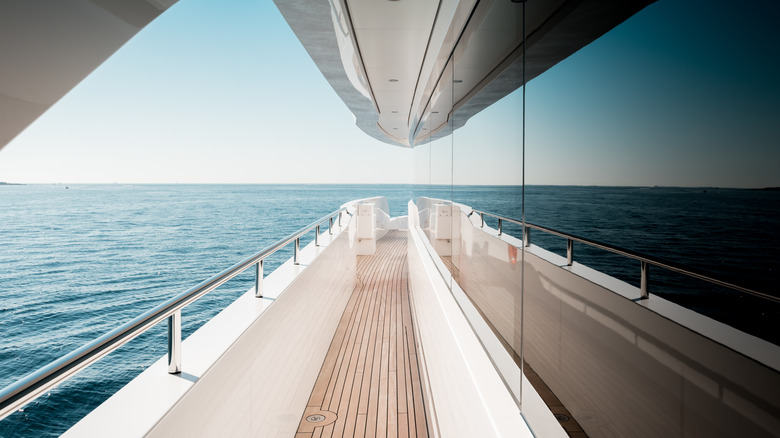
Billionaires are seemingly always seeking to top one another and themselves when it comes to buying jaw-droppingly expensive and ridiculous objects. In 2011, an anonymous Malaysian man, rumored to be business tycoon Robert Kuok, may have moved to the head of the pack when he allegedly bought the hilariously named History Supreme, a yacht made of such materials as solid gold, platinum, meteoric stone, and the bone of a tyrannosaurus rex. According to Business Insider , Kuok is a notoriously private self-made billionaire who heads the Kuok Group, a multinational conglomerate that owns assorted businesses around the world. When he bought the History Supreme for $4.8 billion, he reportedly spent a third of his $12.8 billion fortune. According to Forbes , in 2021 the 97-year-old is the 171st richest person in the world with a net worth of $12.6 billion.
As reported by the Daily Mail , the History Supreme is made up of over 100,000 kg (that's over 220,000 pounds) of platinum and gold; the entire base of the boat is wrapped in solid gold and the precious metals are used throughout, while the aforementioned meteoric stone and dinosaur bone make up a "wall feature" in the master bedroom. Additional features, per Jetset Magazine , include a luxury liquor bottle adorned with a rare 18.5 carat diamond, a custom iPhone encrusted in 500 diamonds, including two special interchangable home button diamonds, and a panoramic Aquavista wall aquarium made from 24-carat gold, presumably setting a new standard when it comes to panoramic yacht aquariums.
Is the History Supreme a hoax?

The History Supreme yacht is the handiwork of British designer Stuart Hughes who per his website has also made such collectibles for the ultrarich as the world's most expensive suit, the world's most expensive iPhone, the world's most expensive model car, and a solid gold Rolls Royce Phantom. According to Jetset Magazine , the "anonymous Malaysian business man" (probably Robert Kuok, shown above) commissioned Hughes via a friend in his yachting circle; Hughes never met the person for whom the yacht was intended, but was given completely free reign in terms of the ship's design and construction. The project took three years to complete.
To add to the History Supreme's mystique, some people don't believe it exists at all. Autoevolution says it "was never real, it was never made and no, it does not exist," noting that Italian company Baia Yachts issued a statement claiming the pictures of History Supreme's interior on Hughes' website were stolen from their site and used without permission. MoneyInc and YachtHarbor also lay out the case for the entire story being a hoax, with MoneyInc noting that at one point Kuok deconstructed his Hong Kong mansion into several smaller homes to avoid an ostentatious display of wealth, which makes his commission of the world's most luxurious yacht seem unlikely. Furthermore, as Kuok is known for staying out of the public eye, perhaps Hughes chose him as the supposed customer because he is hard to reach and therefore will not confirm or deny the yacht's existence. The History Supreme section of Hugh's website remains intact.
Did the Eclipse get eclipsed?
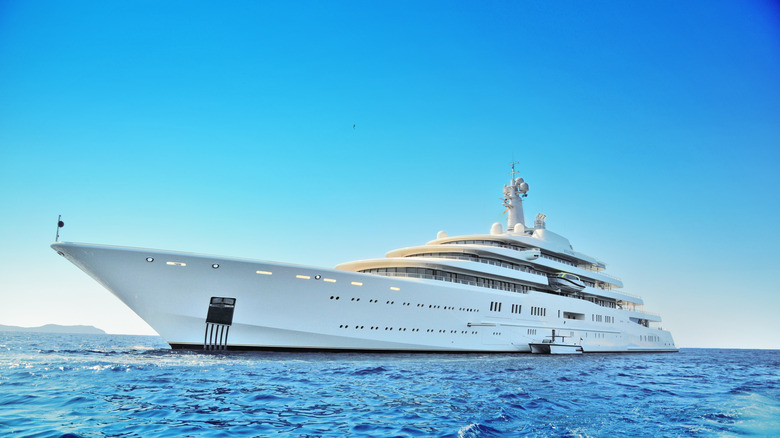
Before the possible existence of the History Supreme, the title of world's most luxurious yacht belonged to the Eclipse (shown above). Per the Sydney Morning Herald , it was purchased in 2009 by Russian business tycoon Roman Abramovich for $590 million and includes two helipads, a movie theater, a sports complex, its own mini-submarine, and a missile defense system. Created by German shipbuilding company Blohm + Voss, an anonymous Russian yachting expert described it as a "big mansion on water ." When asked why it looked like a military frigate, the expert replied "It's a trend. Private yachts look like military boats these days. The yacht is a statement for many people. It's a statement about power." For those who wanted to try out that sort of morally dubious power without committing, the Eclipse was at one point available for commission for up to 30 guests and 75 crew members via SuperYachtsMonaco at $2 million per week, as reported by Business Insider . It's no longer listed on the site.
Per Robb Report , the world's largest yacht since its construction finished in 2013 has been the Azzam, which comes in at 592 feet and six inches long and can travel at a speed up to 30 knots. Built by yacht company Lürssen , it was commissioned by United Arab Emirates president Khalifa bin Zayed bin Sultan Al Nahyan (per Super Yacht Fan ) and has an interior described as sophisticated and luxe.
Typhoon Gaemi strengthens as it nears Taiwan, two dead, work halted
- Medium Text
- Taiwan shuts financial markets, suspends work, school
- More than 8,000 evacuated from high-risk landslide areas
- Taiwan puts 29,000 soldiers on stand-by for relief efforts
- Two people killed, 201 injured
- TSMC expects normal factory production during typhoon
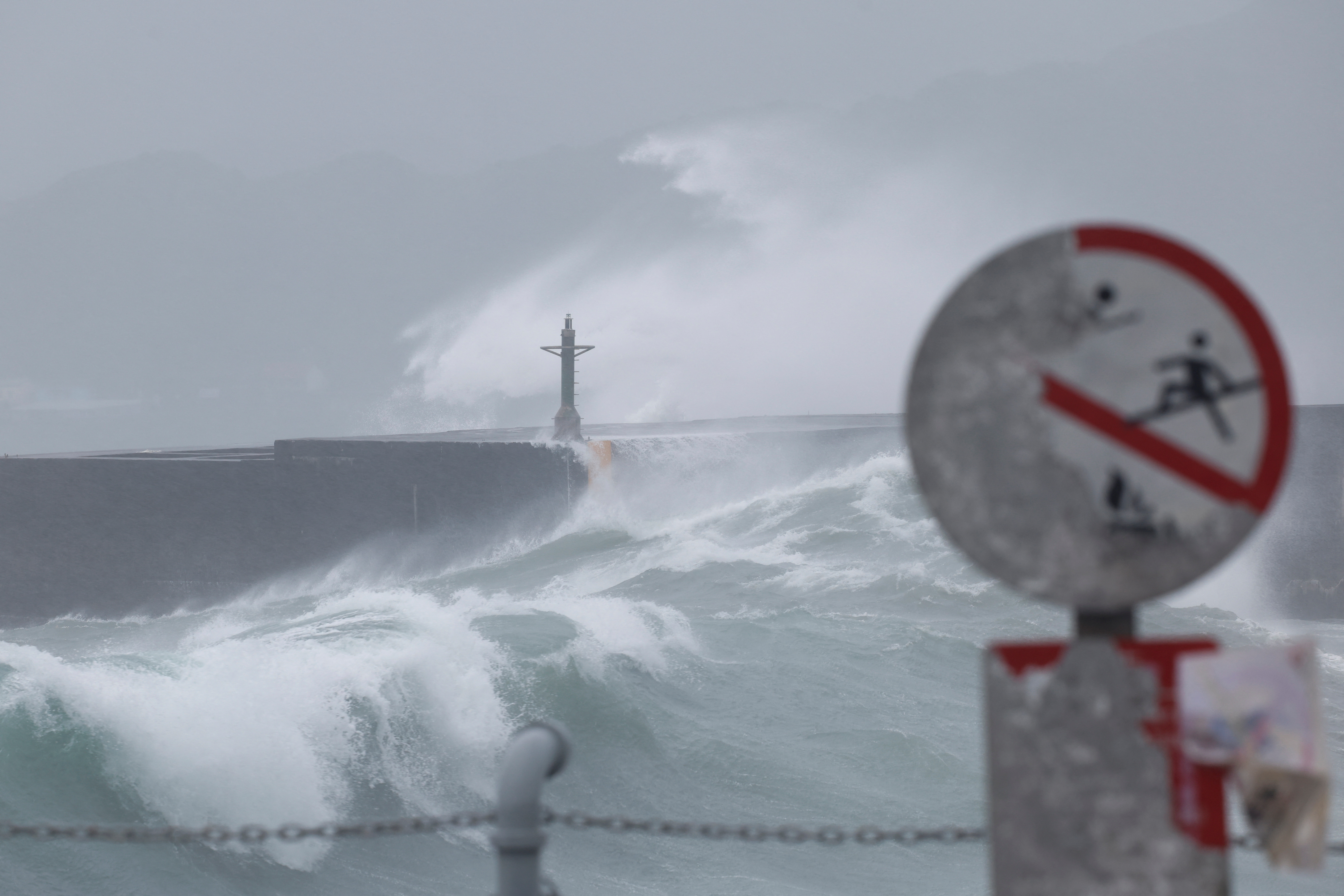
SOLDIERS STANDING BY
Sign up here.
Reporting by Yimou Lee; Additional reporting by Fabian Hamacher and Jeanny Kao in Taipei, Mariko Katsumura in Tokyo, and Bernard Orr and Ryan Woo in Beijing; writing by Ben Blanchard; editing by Himani Sarkar, Clarence Fernandez, Miral Fahmy, Alexandra Hudson and Mark Heinrich
Our Standards: The Thomson Reuters Trust Principles. , opens new tab

Thomson Reuters
Yimou Lee is a Senior Correspondent for Reuters covering everything from Taiwan, including sensitive Taiwan-China relations, China's military aggression and Taiwan's key role as a global semiconductor powerhouse. A three-time SOPA award winner, his reporting from Hong Kong, China, Myanmar and Taiwan over the past decade includes Myanmar's crackdown on Rohingya Muslims, Hong Kong protests and Taiwan's battle against China's multifront campaigns to absorb the island.

Venezuela candidates close campaigns, opposition trusts military to back result
Venezuela opposition candidate Edmundo Gonzalez said on Thursday he trusts the country's military will ensure respect for the result of the presidential election this Sunday, as he and his rival, incumbent President Nicolas Maduro, held final rallies.
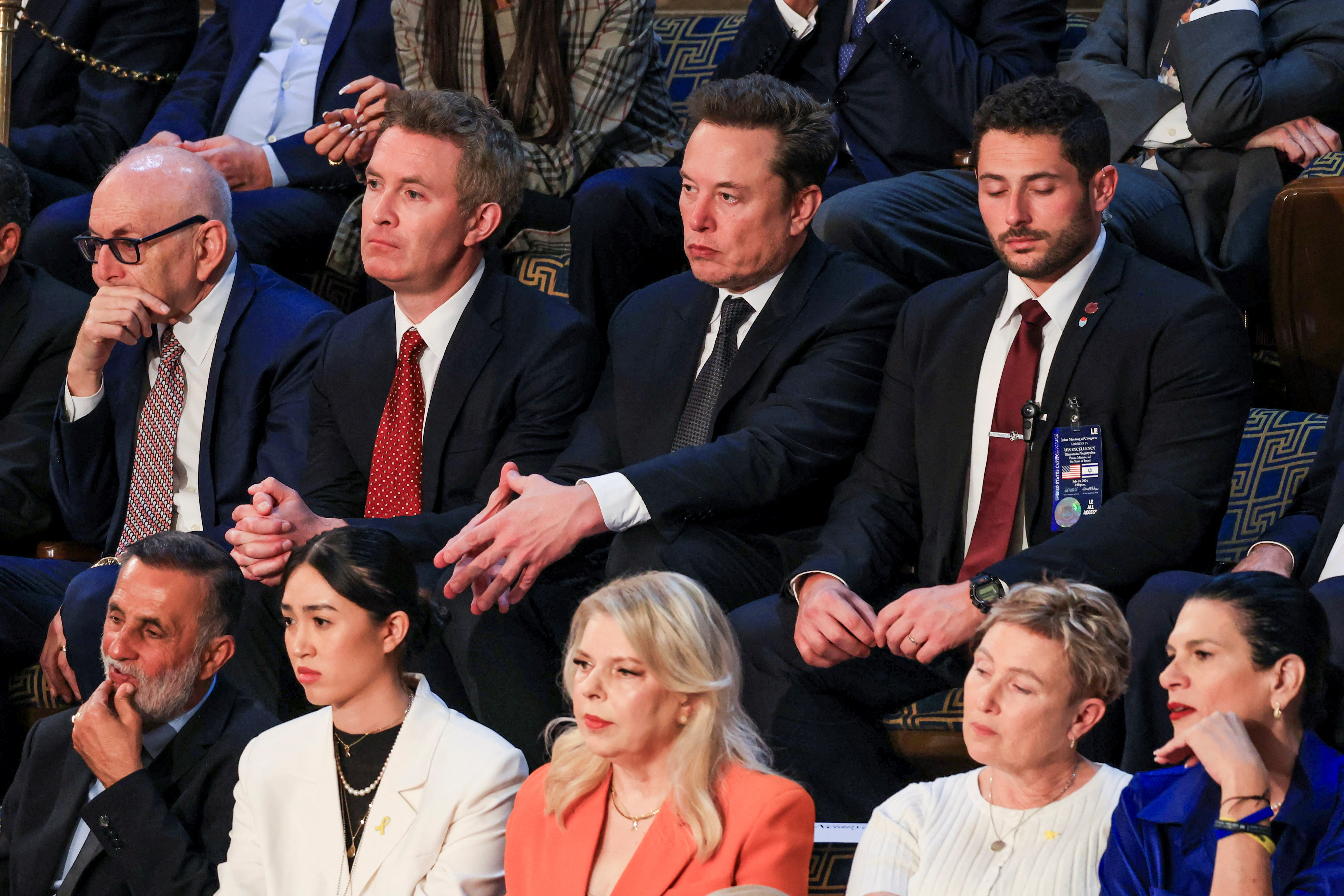

IMAGES
VIDEO
COMMENTS
YACHT AGENCY. Our significant experience in dealing with management, agency and provisioning of superyachts combined with our local knowledge enables us to offer unrivalled 24/7 services. ... Supreme Yachting offers a full range of winterizing, refit and repair options from scheduled annual winterizing works and exterior paint jobs to teak ...
Our yachts offer a variety of entertainment features. Right from DJ facilities with world-class speaker systems to televisions screens for a special live event, performers, and water sport toys - all of it can be arranged at the request of our guests.
Supreme Yachting offers outstanding yacht agency and top tier provisioning services throughout Greece, supported by an international network. Our significant experience in dealing with management, agency and provisioning of Superyachts coupled with our unique local knowledge enables us to offer bespoke yachting services 24/7.
Our team consists of passionate high caliber professionals with profound knowledge of the luxury yacht segment. The combined knowledge spans between yacht charters, sales and central agent services, such as managing and marketing a yacht or a fleet. Supreme yachting has access through various platforms to over 3000 yachts worldwide, and ensures solid contractual agreements
MANAGEMENT MANAGEMENT Supreme Yachting makes sure your yacht is seen in the right place and visited by the correct people. We deploy multiple communications channels to achieve this. We also take care of "everything charter", i.e. negotiations, financials reporting and of course contract issuing! Supreme Yachting Central Agent services introduce a multitude of innovations making
Supreme Yachting takes pride in having the most comprehensive network and have partnered with pedigree yachts available worldwide for chartering. We go above and beyond to ensure that our clients have a seamless and unforgettable experience onboard our luxurious vessels.
Supreme Yachts' journey has been one of constant growth. What began with a handful of passionate individuals has blossomed into a flourishing company with a presence across the globe. Today, we offer a stunning selection of yachts for charter and purchase in various locations, including Turkey, Croatia, the UAE, Greece, Spain, and France ...
On Friday, June 28, the U.S. Supreme Court overturned Chevron in Loper Bright Enterprises v. Raimondo—upending 40 years of precedent that has been cited in dozens of Supreme Court cases and thousands of lower court rulings. At issue is the Administrative Procedure Act and the independence of government agencies, such as the Environmental Protection Agency (EPA).
WASHINGTON — Democratic senators plan to introduce legislation Tuesday that would effectively overturn a Supreme Court ruling last month that imposed new limits on federal agencies when they ...
Democratic U.S. senators on Tuesday introduced a bill designed to undo a ruling last month by the U.S. Supreme Court that curtailed the ability of federal agencies to issue regulations addressing ...
Olympic officials insisted on the right to pull the Games amid U.S. investigations into how the World Anti-Doping Agency handled positive tests for banned substances among Chinese swimmers.
Democrats Push US Senate Bill to Reverse Supreme Court Ruling Curbing Agency Power By Nate Raymond (Reuters) - Democratic U.S. senators on Tuesday introduced a bill designed to undo a ruling last ...
The N&J Difference. Since 1949, Northrop & Johnson has remained the authority on yachting and is recognized as the leading global yacht brokerage offering 360-degree yachting services in the purchase, sale, management, construction and charter of superyachts and luxury boats over 98′ (30m). We are devoted to delivering extraordinary services ...
Environmental Protection Agency administrator Michael Regan is bullish on his agency's prospects against the harshest headwinds in its history, as Republicans, anti-climate industry and an ultra ...
A recent U.S. Supreme Court decision could have important implications for fisheries in Alaska. Last month, the Supreme Court overturned a legal principle called Chevron deference. For 40 years ...
Or visit one of our dealers! Supreme boats offer waves and wakes that scale smoothly from first-timer to professional. These championship wake surfing boats also offer customizable cool that allows you to showcase your individual style and turn every head at the dock doing it. Surf Wake Ride. See why Supreme Boats is the Most Valuable Towboat.
A recent U.S. Supreme Court decision could have important implications for fisheries in Alaska. Last month, the Supreme Court overturned a legal principle called Chevron deference, named after the ...
We are renowed for building large custom made luxury yachts: catamarans, power boats and superyachts. We design, build and charter yachts from 60 up to 200 feet.. Sunreef Yachts Eco is a renowned builder of bespoke luxury yachts, power boats, and custom zero emission catamarans that reconceptualize ocean voyages.
The court's ruling last month, which split the justices 6-3 along ideological lines, said judges should interpret the law as they see fit in most instances where agency actions are challenged.
Russian and Chinese nuclear-capable strategic bombers patrolled near the U.S. state of Alaska in the North Pacific and Arctic on Thursday, the two countries said, a move that prompted the United ...
A Senate Judiciary Committee investigation found that conservative Supreme Court Justice Clarence Thomas failed to disclose at least 35 luxury gifts, including a free yacht trip to Russia and a ...
The U.S. government said it is spending more than $7 million a year to maintain a superyacht it seized from a sanctioned Russian oligarch, and urged a judge to let it auction the vessel before a ...
Evelyn Hockstein/Reuters. Supreme Court Justice Clarence Thomas has been accused of not disclosing a yacht trip to Russia and a private helicopter flight to a palace in President Vladimir Putin ...
Luxury Yacht Group has global resources to build, sell, charter and crew your yacht. Understanding that every happy yacht starts with a competent crew our resources focus on your crew and how they impact your yachting enjoyment. ... Luxury Yacht Group operates the largest crew agency with agents on three continents providing almost 24/7 ...
Have you ever seen a vessel of floating gold? Well, if you are lucky, then there is a chance for you to be on one of the world's most incredible yachts to ev...
Because it overruled Chevron, however, the Supreme Court sent the case back down to the lower courts to consider the rule without giving the agency any deference. Penning the Supreme Court's ...
Section 706 of the APA requires courts to decide all relevant questions of law, but it does not prescribe a de novo standard of review. And two prominent Supreme Court decisions of the 1940s, in the dissent's view, reflected the Supreme Court's deference to agency interpretation in the pre-APA, pre-Chevron era.
Over 20 Republican state attorneys general asked the Supreme Court on Tuesday to temporarily block the Environmental Protection Agency from enforcing new rules that aim to curb planet-warming ...
The History Supreme yacht is the handiwork of British designer Stuart Hughes who per his website has also made such collectibles for the ultrarich as the world's most expensive suit, the world's most expensive iPhone, the world's most expensive model car, and a solid gold Rolls Royce Phantom. According to Jetset Magazine, the "anonymous Malaysian business man" (probably Robert Kuok, shown ...
Taiwan shuts financial markets, suspends work, school; More than 8,000 evacuated from high-risk landslide areas; Taiwan puts 29,000 soldiers on stand-by for relief efforts